#and to be fair the show continues to be misogynistic after this but it improves with every season
Text
visiting Swedish Doctor meets Klinger and offers to put him in touch with another Doctor she knows who could do a gender reassignment surgery for him and Klinger's reaction to learning what she means by that is basically O_O 'I'm crazy, not trans'
It's just a small moment, but having a nice visiting Doctor go "trans rights" on a show from the 70s about the 50s is rather nice
Also this episode is letting Margaret call Hawkeye out on his misogyny, which is also quite nice to see - Hawkeye is definitely the sort of person who tries to be an ally but hates to admit how he falls short himself. He is trying to better himself throughout the episode, though. And it's good to see him realize that wanting to do better doesn't mean shit if he's going to keep putting his foot in his mouth. It's some good character growth for him and I think demonstrates something I do enjoy about MASH very much - they aren't afraid to acknowledge their protagonists are flawed and take them to task for it.
Hawkeye isn't the only one shoving his foot down his throat with the lady Doctor, though. Charles has been making an ass of himself too. Which, seeing his own earlier behavior mirrored in Charles, is definitely a kick in the pants for Hawkeye too.
It ends on a good note for Hawkeye and Margaret too - he didn't apologize on screen, which is a shame - but they're clearly still friends and she knows he's actually taken what she had to say to heart.
#kitkatt0430 watches#mash#for a show that starts off heavily misogynistic it's also calling itself out with this episode#and to be fair the show continues to be misogynistic after this but it improves with every season
5 notes
·
View notes
Text
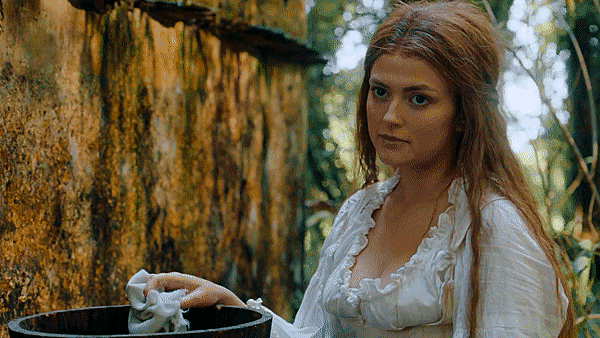
some thoughts about Molly Seagrim (and Tom)
I’ve been meaning to write some meta about Molly for a while, because she deserves it, and because I have lot to say re: what I dislike about Fielding’s treatment of her, what I find compelling, and what choices I might have made differently if I was writing the adaptation.
So I really dislike the way Molly is framed in the novel, because I find it lazy, misogynistic, and uninteresting. Fielding is SO harsh about Molly and particularly about her vanity, which he wants us to know is not equal to her beauty or any of her other merits. Ugh. Especially on my first read, I found the resolution of the affair incredibly annoying, in that it requires Molly to be acting selfishly in ways that excuse Tom at her expense, and leave the egg much more on her face than on his.
Still, I do think Molly COULD be a very compelling character, and her relationship with Tom is quite essential to the overall storyline, as it informs Tom’s relationships with women for the rest of the novel. When Tom’s relationship with Molly is first introduced, he truly believes that because Molly had sex with him, it must mean that she loves him and wants to marry him and that she would quite literally die if he ever left her. To be fair, Molly also feeds him this story, which is another frustrating part of her characterization, because Fielding can’t really seem to decide what her motivations are — is she just vain? Greedy? Stupid? Broken hearted over a different lover? He puts forward all of these as explanations at different points without adequately developing any of them, and it results in some of his most frustrating and incoherent character work.
HOWEVER, there are plenty of interesting nuggets in this arc, most notably that Tom, of course, eventually discovers that Molly doesn't actually really care much about him at all, and is mostly just interested in having sex, and frankly, having varied sexual experiences with different people, which like !!!!! valid!!!!!!!!! Learning this about Molly vastly improves their relationship and Tom continues to respect her and be friends with her for the rest of his life. Please note, I'm separating Tom's feelings about her from Fielding's less-than-glowing narratorial commentary about her, which continues to be pretty shitty. But this understanding that Tom develops -- that women's sexual desires are their own and can exist separately from the men who have "debauched" them -- is pretty fundamental to informing his actions for the rest of the book.
Personally, if I were the one writing the adaption, I think I would have leaned more into exploring Tom’s projections about what Molly wants (and poke fun at him for it as he deserves!), rather than Molly actively manipulating him, and/or explored the more tragic elements of why Molly thinks she needs to frame her own non-romantic desire as love. I think those bits are the most interesting part of the arc and focusing on them would have probably resulted in a more satisfying characterization for me. Instead, it seems like Hughes decided to agree with Fielding that Molly is just sort of annoying and immature. Which, while certainly valid things for women to be, are simply not that interesting to me as primary character traits.
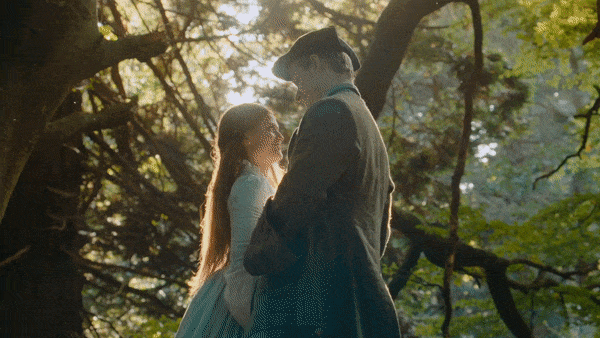
ALSO, there's actually another Molly-Tom scene in the novel that I think is pretty relevant. After Tom discovers Molly with Square (this is a different character than Thwackum, who she is discovered with in the show. They combined Thwackum and Square into a single guy for clarity). After he realizes she's not actually in love with him and they part ways, Molly and Tom have sex again.
This scene was cut from the adaptation and I understand why (lolololololololol) but it's actually one of my favorite scenes in the first act, because I think it illustrates what I'm trying to say about Tom. now that Molly and Tom have admitted and accepted what they really are to each other, they can engage in casual sex for fun to the mutual benefit of them both, and Tom still respects her right to safety and honor in this context. They actually get caught and Tom gets in a fight with Blifil and Thwackum so that she can escape without being discovered, which is a huge contribution to why Tom eventually gets kicked out of Allworthy's house. This is what I mean when I say it's not just Tom sleeping around that gets him villainized, but Tom's desire to see women as people and to relate to sex itself (and sexual women) as morally neutral that makes him so reprehensible to so many of the other characters in the novel. Anyway it's a great scene, very dirty, very horny, it also has some top-tier masturbation innuendo, 10/10 highly recommend.
In conclusion, I think the adaptation could have done a lot worse when it came to Molly, but I think I'd have been more pleased if their choices engaged with the source material in a slightly more critical way.

7 notes
·
View notes
Note
What is your MC relationship with Harper? How is Ethan's relation with her after he is with MC?
Hey Nonny,
I really need to tag my asks better because I know I've answered this but, of course, I can't find it!
I'm limiting the answer to my Ethan/Kaycee world because it is more impactful there, but I'll quickly say that in Tobias/Casey world, Casey and Harper enjoy a cordial relationship and have the highest regard for one another.
Before we begin, let me establish most of Book 3 did not happen in my HC. Sorry, the writer knew less about the story and the character than my late grandma, who died before the series began, so I am not claiming it. So all the absolute foolishness they started with Harper didn't happen. Why? It was all so OOC for all characters involved, so I'm not having it. lol
Harper is a gorgeous, successful, self-confident woman. She isn't begging for any man. Period. When Ethan said they were over for good, she said OK and went on to better things. Sorry, not sorry. Ethan, Mr. Emotional constipation, was not about to be flirting with his ex (who he's still friends with) in front of his colleagues, especially when he's dating one of those colleagues. Please.
So with that stupidity out of the way... I also don't have Harper turning MC in, but I "wouldn't if it were Ethan." Because... 90% of Book 3 didn't happen. lol
Kaycee respected Harper as an intern but was a bit intimidated by her. Harper was impressed with Kaycee's background but was reserving judgment. She did see sparks between Ethan and Kaycee, and while I don't think for a moment she was jealous, I think she did have concerns about a highly regarded attending and an intern being involved. She'd probably be at least a little pissed that Ethan ended things with her because she was his boss, and now he's involved with an intern, but just because she'd find it hypocritical. She's not pining for the man.
The relationship between the two women improved when Kaycee approached Harper and confessed to being the one to administer the drug to Mrs. Martinez. Harper felt it took courage and integrity to own up to her actions, so there was a level of respect even though she didn't approve of her choices. Seeing Kaycee fight so hard to continue her medical career sealed the deal. She admired Kaycee, and, in turn, Kaycee admired her for her fairness in her approach to the situation. (Let's be serious, IRL, it wouldn't have been so pretty for MC.)
Ethan was always friends with Harper, so there was no real change in his relationship with her after he and Kaycee started dating. Keep in mind they became quasi-public after the attack, and at that point, everyone was looking at things through a different lens.... including Harper. People aren't going to criticize as much knowing what just occurred.
I think Ethan & Harper remain the closest of friends, and Kaycee and Harper are not as close but consider each other friends as well.
I'm really not a fan of the successful women being at each other's throats tropes. When I portray what could be perceived by some as nasty relationships between women, I am careful to show there are reasons that belie it, not "we're jealous over each other's success or (worse yet) a stupid man." I am all for removing those misogynistic stereotypes from our existence - and I was super pissed at PB for playing into them - poorly at that.
Thanks for the ask, Nonny!
4 notes
·
View notes
Note
Wait. Why do you think Wanda is going to die. Surely she wouldn’t not have any major appearances for so long only to randomly show up in an x title and die? As the lead-in to the “trial of magneto” no less? I’m already sure magneto didn’t do the murder but mags has been actively reaching out to Wanda and still considers her a daughter… it just doesn’t seem believable
It's a theory that I've seen mentioned a few times here and on twitter. The only real hard evidence, as far as I'm aware, is that some wips and other preview images have surfaced which might be variant covers for Trial of Magneto, and appear to include Wanda.
The prevailing theory seems to be that Wanda will either martyr herself for her crimes (M-day) or willingly be killed, and subsequently resurrected, in order to prove that she actually is a mutant. Setting aside the fact that Krakoan resurrection is a man-made process which relies on man-made methods of identifying and recording mutants, and so it stands to reason that you can test somebody for mutation without KILLING THEM*, I'm just sick to death of how the X-Men franchise is treating this character.
Wanda is not suicidal. Wanda is neither consumed by grief, nor is she willing to fall on the proverbial sword in the name of justice. Although progress has been staggered, her trajectory over the last decade has been one of healing and restored dignity. Children's Crusade revised HoM to better explain Wanda's condition, and showed that she had both the means and the motive to help depowered mutants. AvX gave her further opportunities to aid the mutant community and enact transformative reparations, and she continued rebuilding her relationships with all sorts of X-Men characters in the years following. Even after the bullshit AXIS retcon, Scarlet Witch went to great lengths to not only improve Wanda's representation of mental illness, but put the character on a path where she could finally move past the shadow of HoM with her own storylines and her own inner life. Her subsequent appearances in Avengers and Doctor Strange titles have expanded on the notion that Wanda has a life where she's thriving, with healthy relationships and a career in magic that she loves.
Anybody with an ounce of reading comprehension should be able to understand that Wanda was not fully culpable for what happened in House of M, and anybody with an ounce of compassion should be able to understand that the whole saga was hugely ableist and misogynistic. It hasn't always been perfect, but there have been so many attempts to repair both Wanda as a character, and the harmful messaging that was projected onto her. Wanda's portrayal in the current era of X-Men, however, contradicts all of that. Hickman et al have parroted the worst parts of her 2000s treatment, through both secondary and direct characterization, and, I'm sorry, but it's not fair.
Those theories are not unfounded. I absolutely believe that this scenario would be in keeping with Wanda's appearance in Empyre: X-Men, and with the way that her history has been represented, generally, on Krakoa. It just really sucks that all of the efforts to fix this character are being undone in X-Men, and it's especially annoying after Marvel went to such lengths to divest her from the X franchise. And, honestly, I don't enjoy feeling like I'm being punished for investing myself in this character.
Also, if anything does happen to Wanda, and Leah Williams doesn't account for the fact that her son is there at the Gala, I'm going to lose my mind. If there's no response from Tommy, Billy, or Pietro, that will just completely break the characters for me. Like, let's get real-- Billy has all of Wanda's powers, and he's married to the king of an intergalactic empire. If the X-Men ever hurt his mother, they'd have a second Decimation on their hands. I mean, killing her would practically be a declaration of war with the Alliance. I'm just saying.
*this is literally what happened with Franklin Richards.
#THIS WAS NOT MEANT AS SHADE TO ANYONE WHO POSTED THEORIES OR GATHERED EVIDENCE#that's why I'm making my own posts instead of commenting on any of their's#and I don't mean to be incessantly negative or demand that writers should only pander to my taste and interests#I just want Wanda and her family to be well realized characters with compelling plotlines that serve their growth and trajectory#and as a gitano it does sting to be constantly denied this with like... the only characters that even approximately represent me
22 notes
·
View notes
Text
Media Rediscover Afghan Women Only When US Leaves
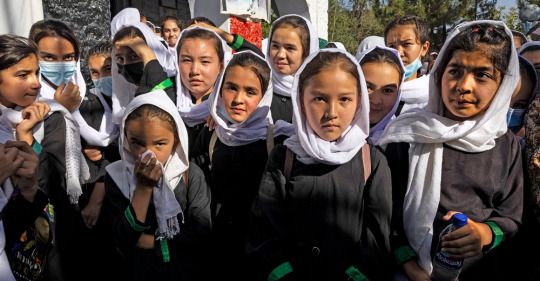
Just as US corporate news media “discovered” Afghan women’s rights only when the US was angling for invasion, their since-forgotten interest returned with a vengeance as US troops exited the country.
After September 11, 2001, the public was subjected to widespread US news coverage of burqa-clad Afghan women in need of US liberation, and celebratory reports after the invasion. Time magazine (11/26/01), for instance, declared that “the greatest pageant of mass liberation since the fight for suffrage” was occurring, as “female faces, shy and bright, emerged from the dark cellars” to stomp on their old veils. In a piece by Nancy Gibbs headlined “Blood and Joy,” the magazine told readers this was “a holiday gift, a reminder of reasons the war was worth fighting beyond those of basic self-defense” (FAIR.org, 4/9/21).
The media interest was highly opportunistic. Between January 2000 and September 11, 2001, there were 15 US newspaper articles and 33 broadcast TV reports about women’s rights in Afghanistan. In the 16 weeks between September 12 and January 1, 2002, those numbers skyrocketed to 93 and 628, before plummeting once again (Media, Culture & Society, 9/1/05).
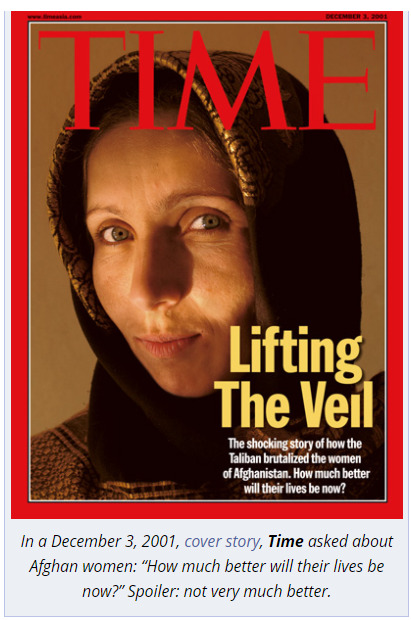
Suddenly remembering women
Now, as the US finally is withdrawing its last troops, many corporate media commentators put women and girls at the center of the analysis, as when Wolf Blitzer (CNN Situation Room, 8/16/21), after referring to “the horror awaiting women and girls in Afghanistan,” reported:
President Biden saying he stands, and I’m quoting him now, squarely, squarely behind this decision to withdraw US forces from Afghanistan, despite the shocking scene of chaos and desperation as the country fell in a matter of only a few hours under Taliban control, and the group’s extremist ideology has tremendous and extremely disturbing implications for everyone in Afghanistan, but especially the women and girls.
This type of framing teed up hawkish guests, who proliferate on TV guest lists, to use women as a political football to oppose withdrawal. Blitzer guest Rep. Adam Kinzinger (R.-Illinois), for instance, argued:
Look at the freedom that is being deprived from the Afghan people as the Taliban move into Afghan, or moving into parts of Afghanistan now, and you know how much freedom they had. Look at the number of women that are out there making careers, that are thought leaders, that are academics, that never would have happened under the Taliban leadership…. The devastation you are seeing today is why that small footprint of 2,500 US troops was so important.
Sen. Joni Ernst (R.-Iowa) gladly gave Jake Tapper (CNN Newsroom, 8/16/21) her take on the situation after CNN aired a report on the situation for women:
As you mentioned, for women and younger girls, this is also very devastating for them. The humiliation that they will endure at the hands of the Taliban all around this is just a horrible, horrible mar on the United States under President Joe Biden.
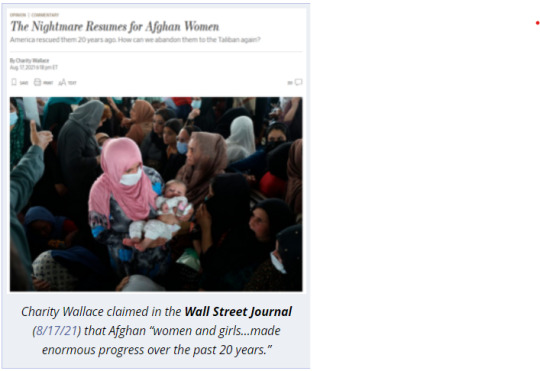
‘America rescued them’
Charity Wallace claimed in the Wall Street Journal (8/17/21) that Afghan “women and girls…made enormous progress over the past 20 years.”
Such analysis depends on the assumption that the US invasion and occupation “saved” Afghan women. In the Wall Street Journal (8/17/21), an op-ed by former George W. Bush staffer Charity Wallace ran under the headline : “The Nightmare Resumes for Afghan Women: America Rescued Them 20 Years Ago. How Can We Abandon Them to the Taliban Again?”
Two days later, a news article in the Journal (8/19/21) about the fate of women in Afghanistan explained: “Following the 2001 invasion, US and allied forces invested heavily to promote gender equality.”
The Associated Press (8/14/21), in a piece headlined, “Longest War: Were America’s Decades in Afghanistan Worth It?,” noted at the end that “some Afghans—asked that question before the Taliban’s stunning sweep last week—respond that it’s more than time for Americans to let Afghans handle their own affairs.” It continued, “But one 21-year-old woman, Shogufa, says American troops’ two decades on the ground meant all the difference for her.” After describing Shogufa’s experience for five paragraphs, the piece concludes with her “message to Americans”:
“Thank you for everything you have done in Afghanistan,” she said, in good but imperfect English. “The other thing was to request that they stay with us.”
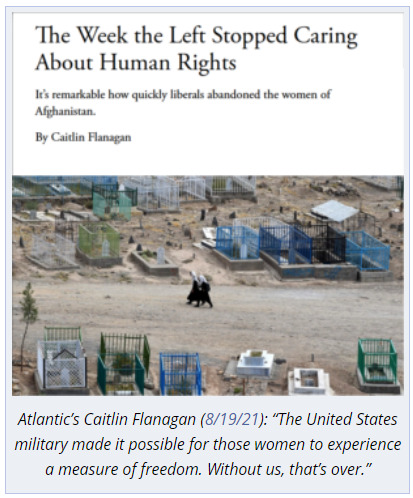
Perhaps the most indignant media piece about Afghan women came from Caitlin Flanagan in the Atlantic (8/19/21), “The Week the Left Stopped Caring About Human Rights.” Flanagan argued:
Leave American troops idle long enough, and before you know it, they’re building schools and protecting women. We found an actual patriarchy in Afghanistan, and with nothing else to do, we started smashing it down. Contra the Nation, it’s hard to believe that Afghan women “won” gains in human rights, considering how quickly those gains are sure now to be revoked. The United States military made it possible for those women to experience a measure of freedom. Without us, that’s over.
Flanagan pointed to Afghan activist Malala Yousafzai, whom she accused “critics of the war” of forgetting, saying Yousafzai “appealed to the president to take ‘a bold step’ to stave off disaster.”
Next to last in women’s rights
Such coverage gives the impression that Afghan women desperately want the US occupation to continue, and that military occupation has always been the only way for the US to help them. But for two decades, women’s rights groups have been arguing that the US needed to support local women’s efforts and a local peace process. Instead, both Democrat and Republican administrations continued to funnel trillions of dollars into the war effort, propping up misogynist warlords and fueling violence and corruption.
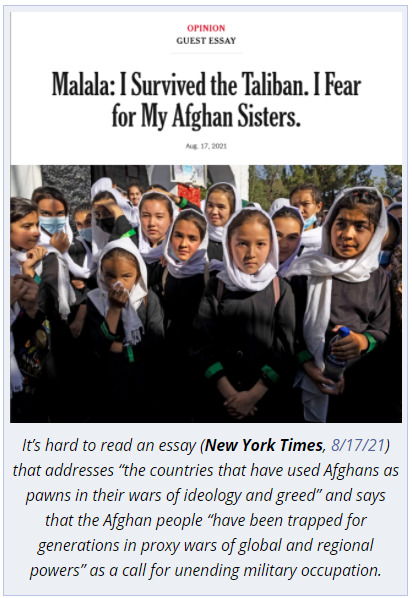
Contra Flanagan’s insinuation, Yousafzai didn’t ask Biden to continue the occupation. In an op-ed for the New York Times (8/17/21) that most clearly laid out her appeal, she asked for humanitarian aid in Afghanistan and for refugees fleeing the country. In fact, her take on the US occupation’s role in women’s rights (BBC, 8/17/21) is much more critical than most voices in the US corporate media: “There had been very little interest in focusing on the humanitarian aid and the humanitarian work.”
As human rights expert Phyllis Bennis told FAIR’s radio program CounterSpin (2/17/21), Malalai Joya, a young member of parliament, told her in the midst of the 2009 troop surge that women in Afghanistan have three enemies: the Taliban, warlords supported by the US and the US occupation. “She said, ‘If you in the West could get the US occupation out, we’d only have two.’”
Things did get better for some women, mostly in the big cities, where new opportunities in education, work and political representation became possible with the Taliban removed from power. But as Shreya Chattopadhyay pointed out in the Nation (8/9/21), the US commitment to women was little more than window dressing on its war, devoting roughly 1,000 times more funding to military expenses than to women’s rights.
Passive consumers of US corporate news media might be surprised to learn that Afghanistan, in its 19th year under US occupation, ranked second-to-last in the world on women’s well-being and empowerment, according to the Women, Peace and Security Index (2019).
As the Index notes, Afghan women still suffer from discriminatory laws at a level roughly on par with Iraq, and an extraordinarily low 12.2% of women reported feeling safe walking alone at night in their community, more than 4 points lower than in any other country. And just one in three girls goes to school.
Wrong kind of ‘help’
In 2015, a 27-year-old Afghan woman named Farkhunda Malikzada was killed by an angry mob of men in Kabul after being falsely accused of burning a Quran; US-backed Afghan security forces watched silently (Guardian, 3/28/15). The shocking story spread around the world, but the only US TV network to mention it on air was PBS (7/2/15), which offered a brief report more than three months after the murder, when an Afghan appeals court overturned the death sentences given to some of the men involved.
FAIR turned up no evidence of Caitlin Flanagan ever writing about Malikzada, either—or about the plight of any Afghan woman before last week.
According to a Nexis search, TV news shows aired more segments that mentioned women’s rights in the same sentence as Afghanistan in the last seven days (42) than in the previous seven years (37).
The US did not “rescue” Afghan women with its military invasion in 2001, or its subsequent 20-year occupation. Afghan women need international help, but facile and opportunistic US media coverage pushes toward the same wrong kind of help that it’s been pushing for the last two decades: military “assistance,” rather than diplomacy and aid.
For more than 20 years, US corporate media could have listened seriously to Afghan women and their concerns, bringing attention to their own efforts to improve their situation. Instead, those media outlets are proving once again that Afghan women’s rights are only of interest to them when they can be used to prop up imperialism and the military industrial complex.
2 notes
·
View notes
Text
Movie Review: Birds of Prey (Spoilers)
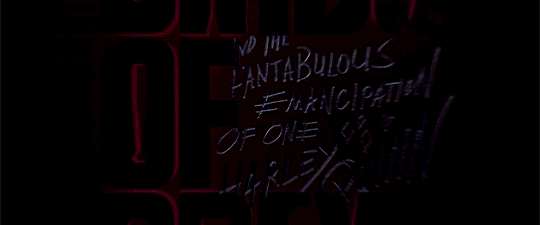
Spoiler Warning: I am posting this review a week after the movie airs worldwide, so if you have not yet seen the movie do not read on until you have.
Characters:
Harley Quinn:

This is most definitely Margot Robbie’s signature role. Just like Johnny Depp has Jack Sparrow and Gal Gadot has Wonder Woman, Margot Robbie is Harley Quinn and I am not just saying that because she’s the only cinematic version we have.
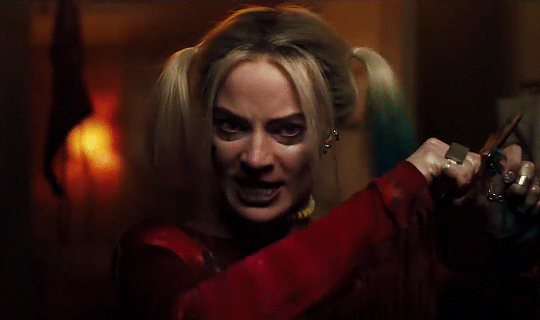
I really enjoyed the “Galentine’s” movie angle as this movie was released around the traditionally loved-up holiday and Galentine’s is an anti-approach to it. But showing how Harley bounced back after being dumped by the Joker with the traditional break-up tropes of a bad haircut, partying, drinking and generally hitting self destruct was a lot of fun, particularly from Harley’s perspective.
Also the link with her roller derby hobby at the start of the movie showing how she’s moved on to the end of the movie when she uses her roller derby skills in a positive way was really great, and one of the few things I really like about her comics redesign.
As I said in my non-spoiler review, I thought Margot Robbie’s comedy as Harley Quinn had greatly improved from Suicide Squad to here, whether or not that’s better writers or Robbie’s own performance I don’t know. But Margot Robbie, to be fair to her, is funny when given the right material. Just look at how she delivered Brad Pitt’s acceptance speech at the BAFTAs.
But she had a lot of great one-liners and even character moments where it was just physical acting or face acting that just make me laugh every time I watch the movie, and I so far have seen it three times.

My favourite funny lines from her are “Run piggy run!” when she’s gunning down the GCPD officers with glitter rounds, “Does she have to keep running?!” when trying to chase Cassandra through the evidence room while also battling with the mercenaries looking to claim Sionis’ bounty, and when she is explaining why the main women of the movie need to team-up in the most realistic way possible ending with “...so unless we all want to die extremely painful deaths and let Roman go finger fondling around the kid’s intestinal track...”.

In terms of her silent comedy, I loved when she ran for the truck she used to blow up Ace Chemicals, Margot Robbie is a good drunk actor. The way she ran with her arms out but then momentarily stopped seeing the actual driver before continuing anyway, I’m cracking up now just thinking about it.
Also whenever she came across someone who was after her or she had an idea, the way she would sign or look confused or have her trademark devilish grin was fantastic.
In regards to her character development, I am beyond thrilled that they let Harley be Harleen in this movie.
During Suicide Squad she had one or two moments where she did analyse the team and especially in the extended cut she went through the group.

Here though right from the start with Roman in his club she lays out his psyche in front of him and in turn I believe throughout the movie analyses all the main players with the exception of Zsasz.
It did weigh in to the comedy but the fact she had an analysis for everyone so unique to them; Sionis with his insecurities, Canary being a harlequin of sorts, Montoya being stuck in the past, Huntress and her childhood trauma. It was all superb and exactly what I want from Harley.
Even psychoanalysing herself when explaining herself to Cassandra, how she was a psychologist working at Arkham before falling in love with her patient and helping him escape, then being arrested herself and becoming a member of the Suicide Squad, but escaping before being dumped. Serious and professional Harley is just as important to me as the wacky Harlequin of Chaos.

Also the fact she is still a dangerous character both with her actions and unhinged mind. She is a very calculating individual and that’s again a lot to do with her psychological background.
When she manages to save her skin (literally) with Black Mask by telling him she can get his diamond back from Cassandra Cain, the fact she���s clearly hesitant from just turning her over and simply wants the diamond, you can see the frustration in her when Cassandra originally refuses to hand it over before admitting she ate it.
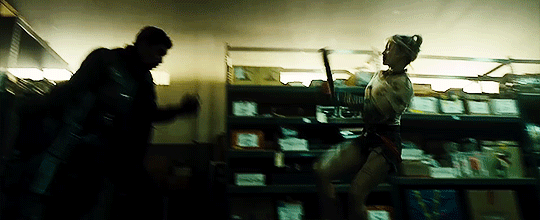
Speaking of what I want to see from my Harley, her action sequences were so good. Harley is an acrobatic character and while we saw shades of that in Suicide Squad, here not only was she doing kicks and flips, but the way she used that baseball bat and her roller skates was everything for me.
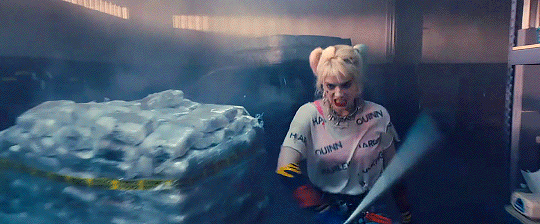
Yes Harley with a mallet and a form of firearm will always be Harley, but this is old-school Harley and it works so well.
While I do think Margot Robbie’s storytelling style could be considered all over the place, in the context of Harley Quinn it is such a good narrative because Harley’s mind is all over the place.

I love me a cute animal sidekick and, while neither animals in this movie are cute (or real), I thought Bruce the Hyena was a great addition despite not really doing anything. If you’ve seen him in the trailers you’ve seen him in the movie.
I am hoping that some day soon they could afford to render two hyenas so we can finally get Bud and Lou on the big screen because Harley with her hyenas is such a great partnership.
Harley with a beaver on the other hand...I am just glad it wasn’t played up and used in cheap inuendos. It is slightly annoying that when her apartment was blown up, she had to save the beaver and even at the end of the movie, once it was revealed that Bruce was safe, the beaver was also there. I just don’t get the fascination with it.
Black Canary:
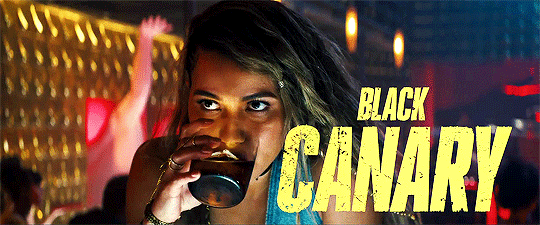
Jurnee Smolett-Bell, as I said in my non-spoiler review, is the breakout star of this movie for me. I know Black Canary quite well thanks to Injustice 2, the Arrowverse and even some animated properties, but seeing her in a more realistic setting rather than the suited up version was very refreshing.
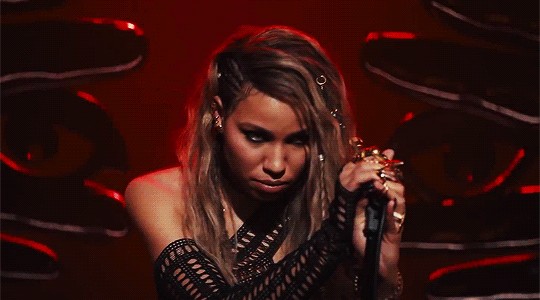
Even the smaller moments for Dinah worked really well thanks to Smolett-Bell’s acting. For example, when that one guy roufees Harley and tries abducting her, the look on Dinah’s face as she’s deciding whether or not to get involved or not was really great.

Giving Black Canary some good action sequences was also the right thing to do because that’s partly what Canary is known for. Not only did she have some great kicks but it was just her attitude and her bravado about how she engaged in her fight choreography.

Also allowing her to sing, I haven’t talked about the music in this movie because while I do love some of the songs used here it wasn’t a lot to rave about, “Man’s World” may be slightly too on the nose for this movie but Smolett-Bell delivered it very well.
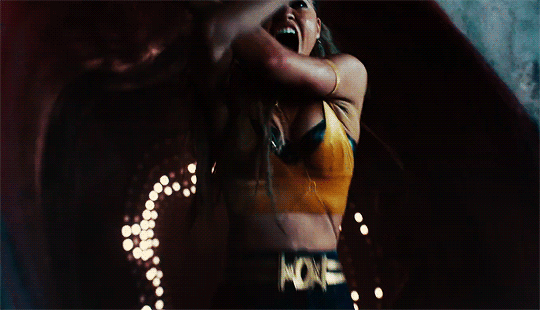
And let’s not forget the other way her voice was used, we have our Canary Cry and I am thrilled...mostly. Having it used once at the end of the movie and that’s it does seem like a bit of a waste, but it does make sense with in the context of this movie.
Black Canary is the only metahuman in this movie and on the team and so if she used her power all the time there would be no need for Huntress or even Harley.
However, the fact she fainted after using it once I found interesting. I am not taking the same approach as some by saying it was stupid because I feel the way Dinah’s story is told in this movie that she may not use it a lot and so she may not be vocally trained or durable enough to sustain.
On that note, the nod to Dinah’s mother, aka the original Black Canary, originally being a vigilante with the same Canary Cry as Dinah I also felt played into Dinah’s character. She knows what her mother was like and the fact she died, so of course she didn’t want that life and so didn’t use her power which is why it’s so overwhelming for her.
I do wish her outfits had been more Black Canary-esk. I would have loved more fishnets and definitely a leather jacket rather than that weird disco suit jacket she had on for a lot of the movie.
However, the gold trousers and matching boots were fabulous.
Black Mask:
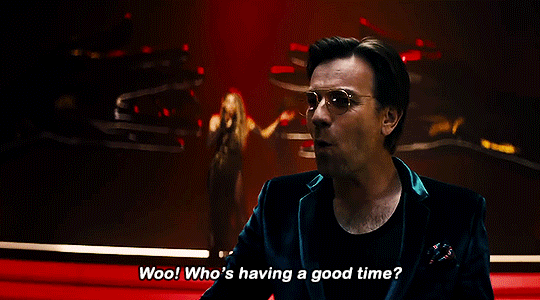
Ewan McGregor can do no wrong for me really, there is just such a charm and charisma about the actor that I can’t help but like him in everything he is in.
That being said, I will say I know nothing about Black Mask from the comics other than he is a psychologically damaged crime lord. I do not believe he is this campy but I am sorry it works for the movie.

I did like how the movie played up Black Mask’s insecurities which Harley diagnosed at the start of the movie. When that one woman was laughing and he thought it was at him so decided to humiliate her, then later on when Zsasz revealed that Dinah betrayed him and he just flipped.
I’m not entirely sure if Black Mask is this misogynistic in the comics but it seems to be that every woman in this movie was at his mercy. At the start of the movie he clearly had a begrudging relationship with Harley because of her association with The Joker, however, after it was revealed that she had been dumped it seemed like he wanted her but then it’s revealed he just wants to kill her.

Bottom line, Roman Sionis was definitely a dangerous individual and Ewan McGregor played that brilliantly, but there was also a campy and somewhat sadistically comedic edge to him which gave way to a rather brilliant DC villain.
However, the very fact that his tenure in the DCEU is short-lived given that he was literally blown up at the end of the movie, it is sad that we will never see him going forward.
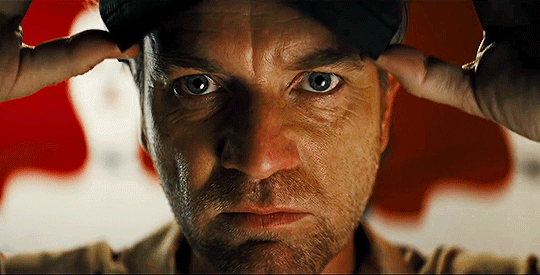
Also on the subject of his actual mask, I know it’s supposed to be welded to his face or something, I’m kind of glad it wasn’t but do wish we had seen it more throughout the movie. Also I feel it would have popped more with the white suit rather than the black, just saying.
Huntress:

While Mary Elizabeth Winstead was a great choice for Huntress here, I do feel that the movie missed a trick and a way to bring other strong female characters into the movie.
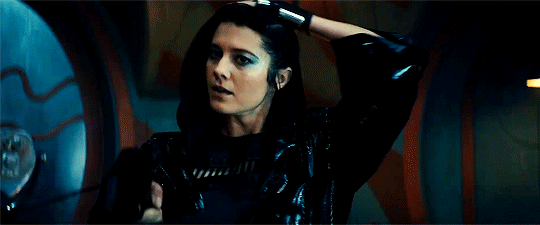
Alright so the movie honours Helena’s origins of being the daughter of a crime boss whose entire family is murdered and so she trains to become an assassin and comes to Gotham seeking vengeance.
However, how great would it have been if, rather than Sicily, if she was trained by either the League of Assassins or even Lady Shiva herself.
I know that this is more of a Cassandra Cain origin, which they still didn’t do, but it would have been a great way to tie-in these characters and also show a bond between Helena and Cassandra being raised by the same woman maybe.
Then also, if Black Canary and Huntress do get their own spin-off, Lady Shiva could come in as an antagonist and it would see Huntress going up against her old mentor.
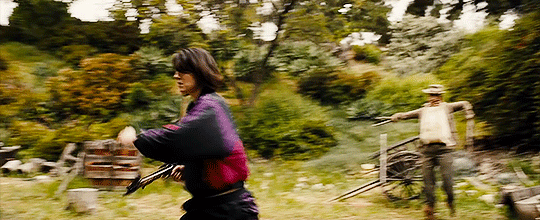
I do think that Winstead did a good job with what she had, I am hoping that Huntress is meant to be socially awkward because that’s definitely the vibes I got from her.
I appreciated her tracksuit attire because Gotham is meant to be in New Jersey and it’s a very gangster Jersey attire.
I hated her last outfit though right at the end, loved the mask but that actual outfit was hideous.
I do see a future for Huntress going forward which is great, I’m not as disappointed with the character as I thought I would be.
Victor Zsasz:
This was an interesting conundrum of a character for me because, like the other two left on this list, if you don’t read the comics or watch the TV shows with these characters in, you’re not going to know who Victor Zsasz from this movie.
I will say, having seen the actor’s transformation from how he normally looks to his Zsasz look, it is a very impressive change and does fit in with the Suicide Squad level changes made to the characters.
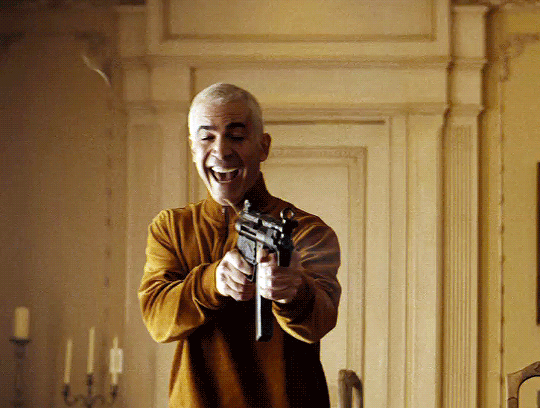
Unfortunately though this is where the impressiveness stops. Yes, Zsasz is an assassin and I did like how they confirmed that he works for various employers, despite the fact it seems that the crime boss who had the Bertinellis killed was in fact working for or with Sionis so was Zsasz just on loan?
But the misogyny of the character was so cringe-worthy and at times unnecessary that it actually makes me side with the fans who put misogyny as this movie’s biggest problem, despite knowing logically that is not strictly true but I do accept it is one of the big problems.

For instance, it is implied that Zsasz only cuts himself to tally the number of women he’s “set free” as opposed to everyone he kills...that is not how Victor Zsasz is supposed to operate. He gives himself a point for every person he kills, that’s what makes him such a terrifying and grotesque adversary.
Okay so I know Anthony Carrigan on Gotham also didn’t go deep into that side of the character, but they didn’t have that Zsasz single out women either.
Also, when he paralysed Harley with that dart and then was effectively playing with her while she was unresponsive...I get she was still aware but even so where I thought that scene was going to go was both unnecessary and only added to why fans were laughing when Harley started repeatedly stabbing Zsasz with that same dart despite him already being dead.
I did like the subtle LGBT representation they tried to showcase with him and Sionis, because even if Sionis wasn’t reciprocating, this was a case of one guy crushing hard on another and feeling he knew what was best and wanting to protect him. That I liked and they played that rather well in my opinion.
But overall, I just didn’t feel that threatened by a supervillain who is essentially the living embodiment of torture porn. I know he cut off people’s faces and had visible scars, but there wasn’t a lot of anything else to make me believe this was the same Victor Zsasz that can easily inspire nightmares just by looking at him.
Cassandra Cain:

I’m just going to put this out there, I don’t know that much about Cassandra Cain. From what I have been told, she was someone who became Batgirl, I know in Young Justice she is in it as Orphan despite I don’t think ever speaking or having her real name revealed, and I know her mother is Lady Shiva.
Which brings me back to a potential storyline going forward for a Black Canary/Huntress TV series to feature Lady Shiva which could also include the return of Cassandra Cain...because I don’t think we need to see her again in the movies.
It is very harsh to judge a child actress, but much like Zsasz honestly if you are unfamiliar with Cassandra Cain as I am you would not really have much takeaway from the character based on this movie.
I also recall there being reports that Margot Robbie stole Cassandra Cain from the upcoming Suicide Squad as a plot point...but now I want to know what the original plan was for Cassandra Cain in The Suicide Squad and if James Gunn would have handled her better.
There just wasn’t a lot of depth to her character. She had a broken arm, potentially from her foster parents, but other than that she was just so angry all the time. She tried being sassy particularly with Harley but it fell flat.
Then in the climactic battle, she is the girl everyone is after to either kill or protect, but in that fun-house scene, as cool as the action was, Cassandra was essentially a hot potato going from character to character and it reminded me a lot of The Jungle Book when Baloo and Bagheera were trying to keep Mowgli away from King Louis and the monkeys.
I don’t really see the point of Harley having an apprentice either, I like the idea that she’s a free agent with no ties. Now that the Birds of Prey are formed she can float between helping them out and doing her own thing or going on another Suicide mission but the point is she rides solo...how are we going to explain where Cassandra is in The Suicide Squad?
Renee Montoya:
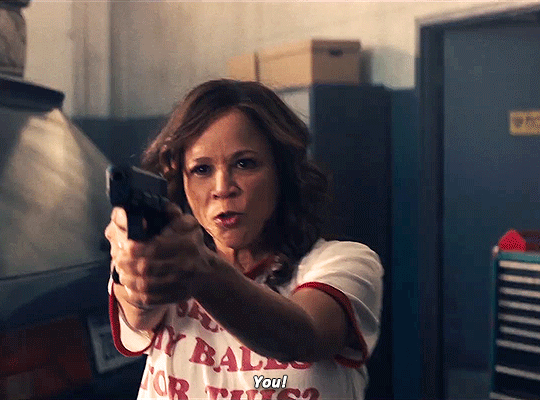
I continuously keep calling Rosie Perez’s character Maggie Sawyer because, in my opinion, this is who she is most like, not Renee Montoya.
Renee is young, determined and the woman who can stand alongside Jim Gordon and Harvey Bullock. She comes from the same origin as Harley Quinn which is Batman: The Animated Series. Yet so far the only incarnation to get her right outside of that has been Batman: Bad Blood where she had a minor appearance as Batwoman’s love interest...which is actually supposed to be Maggie Sawyer.
I said how Cassandra was played as angry, Renee was simply one of these rather aggressive soccer mom characters, especially in that final battle.

She had her funny moments and I do understand where the movie was coming from in trying to show how she was hard done by because of her male colleagues always stealing her glory, but this is a character who again led GCPD missions when Gordon and Bullock were detained in the past, yet I am not getting that essence from this character.
Also Renee, like Maggie Sawyer, is an LGBT character, but while her ex-girlfriend was shown here, if it wasn’t for Harley narrating that fact you would not know they had that history.
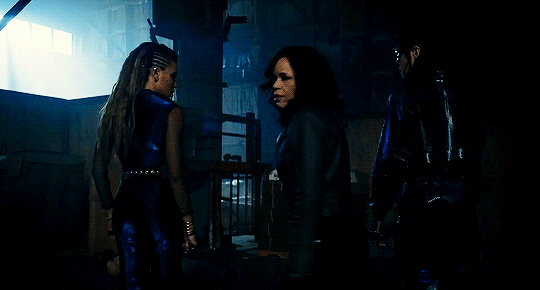
I don’t understand why she also became a founding member of the Birds of Prey, I get that in the comics she has been a liaison between them and the GCPD, but to actually quit her job and fight alongside Black Canary and Huntress? There is a third member needed in that line-up but Renee Montoya is not it.
DCEU Connections:
I will keep calling this universe the DC Extended Universe because until DC itself makes up its mind I am going to stick to what I know.

So in the wider scope of the DCEU, this movie definitely is a follow-up to Suicide Squad, not only because of Margot Robbie’s Harley and the flashbacks we saw of her diving into the acid vat from Ace Chemicals, but also the cheeky Easter-Egg of Captain Boomerang’s wanted poster at the GCPD.
I don’t understand why Captain Boomerang is wanted by the GCPD particularly when he is supposed to be a Flash rogue but I just loved seeing Jai Courtney getting some love.
Also, when the women are suiting up to fight Black Mask and his army, we see Black Canary equip herself with Harley’s Good Night bat from Suicide Squad but also Renee pick up Harley’s “Daddy’s Little Monster” shirt from said movie which Harley takes back as “sentimental value”. I love little connections like that.
In terms of where this movie could branch out to, again I do see a Black Canary/Huntress series in the future maybe including Cassandra Cain and Renee Montoya as guest characters, but movie-wise aside from Harley returning, I don’t see any of this lot coming back.
Also, despite Arrow severely screwing this over, the Black Canary/Green Arrow relationship I could see happen in a TV series but the way they have developed this version of the character I do not see Dinah needing an Emerald Archer in her life.
Overall I rate the movie a solid 7/10, I know I rated Suicide Squad the same and have said this was a better movie, but with everything that DC is pushing recently like Wonder Woman and Aquaman I expected something at that level rather than Shazam! level. Maybe if we got a Gotham City Sirens movie the mark would be higher.
So that’s my review of Birds of Prey and the Fantabulous Emancipation of One Harley Quinn, what did you guys think? Post your comments and check out more DC Movie Reviews as well as other reviews and posts.
#dc#dceu#dc extended universe#birds of prey#birds of prey and the fantabulous emancipation of one harley quinn#harley quinn#harleen quinzel#black canary#dinah lance#the huntress#huntress#helena bertinelli#cassandra cain#black mask#roman sionis#victor zsasz#renee montoya#dc movies#dc comics#margot robbie#jurnee smollett bell#mary elizabeth winstead#ewan mcgregor#rosie perez#chris messina#ella jay basco#suicide squad#the suicide squad#captain boomerang#digger harkness
37 notes
·
View notes
Note
What do you think about Catwoman since Scrooge and Goldie have a Batman/Catwoman relationship? To me, I don't think she's a villain because she doesn't try to take over the world or purposely kill anyone just because. She just steals for herself and looks after herself, but will help others when they need it sometimes.
V is for villain...Goldie is not a villain.
Goldie doesn’t want Scrooge dead.
Goldie doesn’t steal money directly tied to Scrooge.
Goldie steals treasures she and Scrooge are hunting or have hunted in the past.
Goldie saved Scrooge’s life multiple times throughout their adventures based on his biography, and in Golden Lagoon, she saved his life again.
Goldie saved his life in Outlaw and displayed some touching if very rare protectiveness over Scrooge.
Goldie is not good, and Goldie is not bad. Just as it is for Scrooge. Scrooge is not good, and he is not bad. They are people.
Btw, Team Goldie 3000%. Lets get that out of the way.
Carl Barks + DT87
Goldie reaction has been mixed for understandable reasons. There wasn’t a lot of Goldie in past American comics. Barks used her for one story. Don Rosa kept her to the past with some current day comic appearances. DuckTales 87 made them very sweet and tender and cute...but...
Goldie shot at him multiple times.Goldie sent a bear to kill him.Goldie drugged him. (Barks)Goldie hit him in the head with the nugget. (Barks)Scrooge abducted her. (Barks)
Abduction was removed in the original print. Barks didn’t see it as an abduction, but that was what it was. It was eventually returned in later reprints.
Scroldie isn’t a large ship compared to other DT ships, but I watched remember watching a reaction video to their DT17 depiction (Golden Lagoon), and I understood some of their points.
But...I didn’t agree with the DT87 praise, because it doesn’t deserve it in my opinion.
Carl Barks and DuckTales 1987 shared something in common, and it was the lack of character development. Obviously, Barks’ characters evolved and developed their current characterizations. The stories are character driven, but they’re aren’t character arcs.
Uncle Scrooge is going to be this way throughout all his appearances unless the story calls for something ‘different,’ but he’s going to resume his original characterization. He’s always going to be that stingy miser. There are moments of kindness and nice, but the default stays.
Gladstone is always going to be a dick. Donald is always going to be unlucky and you know, stuff like that.
That isn’t a bad thing. I love Carl Barks stories. His stories are good...racial portrayal, not so good, but we’re going to ignore that for this discussion. It worked for the time and medium and the stories he wanted to tell.
DT87...is not character driven.
Like I’ve written for Barks, DT87 didn’t participate in character driven arcs. The series focused on the characters, but there wasn’t any lasting development. It was an episodic series. It stuck to that.
HDL want to stand out and be their own people. Yeah, they finally achieve it, but next episode they’re back to being identical characters.
So Goldie appears three times...and she’s in that role of romantic interest and hasn’t grown as a character or anything like that. She’s fun. She’s cute. Scrooge and Goldie are cute. That’s totally acceptable and adorable and I want more of that in DT17.
But there isn’t any development. There isn’t an arc, and there isn’t a need for an arc since none of the characters are meant to develop and grow in this series. It works for them.
Don Rosa is character driven...but sticks to Barksian Law.
Don Rosa rarely went against the Holy Barks Bible. If it isn’t in Barks, it didn’t happen. If Barks didn’t approve of it, it didn’t happen. He stuck to Barks all the way, and he wrote his stories circling that canon.
Life and Times is a character driven adventure drama that develops Scrooge’s character from idealistic, hardworking poor immigrant child to hardened, cruel, and miserly billionaire.
He did what he could with Goldie based on the information he had, and he made up some of it, leading to very fortunate implications.
But it isn’t Goldie’s story. It’s Scrooge’s. Rosa doesn’t give us her beginning, and we get what’s probably 15% of her middle. By time she reappears, she’s an old woman; aged, matured, wiser, and far more patient than when she was young.
All of that development for Goldie? We didn’t get to see. We didn’t see it in Barks either. Didn’t have time. Didn’t have the drive. We don’t know what happened to Goldie in that time, because where Scrooge grew colder and harder, Goldie became warmer and softer.
Not too soft, but you get it.
DuckTales 2017...is character driven and thrives on character development.
I understand why people may not like Goldie as she is in this continuity, but I cannot find it in me to ever dislike her as a character.
What worries me is that the criticisms about Goldie is that she isn’t as emotionally available or soft or in a position to wait for Scrooge, which I don’t think is misogynistic, but it paints a slightly misogynistic color for me?
Should Goldie be submissive? She never was submissive. Was she soft and emotionally available? Yeah, as an old woman. Had she been that way in her youth, they’d be married.
DT17 strongly relies on character arcs. From Scrooge to Glomgold, there are character arcs and backstories and drama, and characters get to grow and develop.
Scrooge has grown as a person, though he retains his primary characteristics. The same can be said for Donald, Della, the boys, Lena, Webby, and many other characters.
I know it might sound crazy and weird, but I believe Goldie is going to get the same treatment. Why make her Louie’s adult friend if the show didn’t want to improve her as a person and show different facets of her character?
Maybe the show won’t give us Goldie’s beginning and middle, but it’s going to give us the transition from this greedy, gold hungry, cold-hearted thief to a little bit kinder greedy, gold hungry, and not as cold hearted thief who bonds with a child that is so much like her.
This could be naive and short-sighted of me, but I trust the show is going down a route that’ll have Goldie grow. If not, shame on them.
I can go into the whole...I really don’t want Goldie’s character circling 100% around Scrooge, including Louie who is Scrooge’s grand nephew. I’d really like for her to have friends and a life outside of Scrooge, but I am going to put my faith into Frank and his team. I trust them.
Goldie criticism is valid to a point for me, but the impression her detractors give is naivety and short-sightedness. But you know? I probably am too...for having so much faith in Frank and his team. Please, don’t let me down guys.
Goldie appeared physically in two episodes; one focused on her Scrooge, the second a cameo.
Scrooge told Outlaw through his perspective. We don’t know Goldie’s side of the story.
Scrooge loves her the way she is, as much as it frustrates him. He loves her.
Goldie isn’t a villain. That isn’t a fair description of her character and role in the show, and there’s more to her that we haven’t seen. So rather than unfairly judging her, maybe we should wait until we’ve reached the end of her story? DuckTales 2017 wants to go the distance with her.
50 notes
·
View notes
Text
Aoi Zaizen & Misogyny
The characterization Aoi is given in Vrains isn't exactly subtle about how it wants to frame her, but I've had a fair share of ppl try to say the writing isn't misogynistic, and so to prove my argument here, I just figured I'd go beat by beat in her character arc and see what it points to.
Aoi is a character defined by her helplessness. Before we even meet her, she is made helpless. From the very beginning her struggle is about her brother trying to watch out for her because he's worried she'll get hurt- this isn't inherently a bad setup for a conflict or a character arc, I'm not say saying it is. But it's already starting Aoi off in a position where she is being protected, and any attempt to break out of that is considered selfish. We are expected to understand early on that Aoi is putting herself in circumstances she cannot handle by getting involved in the plot. And it shows. Before she even gets her first duel, Aoi is brainwashed. That's a new record, even amongst Yugioh girls.
The duel with Playmaker is, itself, fine. It's pretty well written and it allows the potential for future growth on Aoi's part. But it'd be wrong not to note that it's this situation that reinforces her helplessness and puts her in coma #1. Aoi is being controlled and is reliant on Playmaker to defeat her, and later, to save her. Her consciousness is wagered in the duel against Revolver, yet it always seems strange that it is. Yusaku's motivation for fighting Revolver is absolutely not about Aoi, it's about his revenge. Aoi is an afterthought. He's not dueling Revolver to save her, it's her needing to be saved that gave him the opportunity to duel Revolver. They have enough tension at play by this point to make Aoi's involvement irrelevant, the only contribution it offers is the occasional shot of Akira watching the duel.
I'm gonna mainly gloss over the duel against the A.I. and Akira vs Yusaku aside from noting a few things. Aoi defeating the AI is fine, it gives her a decent win. It's mostly a result of being on Playmaker's side, and it's not really a significant opponent, but it's a meaningful win if it establishes a new character shift. Which I'll go on to establish it doesn't do. Aoi reaching out to Playmaker and wanting to know his story would also be meaningful and relevant if it went anywhere, but 50 episodes later she still doesn't know Playmaker's identity and had to be given another connection to the lost incident bc her relation to Yusaku was that weak.
So in any case. Aoi awakens from coma #1 and is determined not to be weak anymore, and decides to fight for the sake of others in her duel against Vaira. This is the ONLY relevant win she ever gets, and the one everyone seems to love to parade around as if it proves the rest of her losses don't count, or that I'd be the misogynistic one for ignoring this win. This is ignoring, however, that this duel was part of a series of duels building up Aoi, Yusaku, and Go as they ALL got their own respective Knight of Hanoi to defeat in order to bump up their characters. Go and Aoi hadn't done much by this point, and if they were meant to be Playmaker's partners, they needed something additional to build them up. This one win can't be counted as any more significant than Go's win against Doctor Genome or Yusaku's win against Faust. I like these episodes, I like the way Aoi is written in them and I LOVE that she gets to be the hero. But it's disingenuous to imply this single instance of winning dismisses the following assault of bad writing.
As part of her decision to fight for others, Aoi sympathizes with and even tries to save Specter, who by all means she should have every right to hate. In a twist of backwards development, he gets to win, so that he can have a hastily-constructed reason to duel Playmaker instead, making her the only one to lose to a minor villain out of the party. This duel is riddled with Bad Stuff so much so that I don't even feel a real need to touch on it. The main thing of note though is that the annoying plant man's arrogance comes from the fact that he sees everything coming, nothing surprises him. He gets to be in control the whole time, guiding Aoi along as he mocks her. She is helpless from the beginning of this duel. Whether or not you'd like to claim Specter specifically is a well written character is it's own argument, but necessary in that conversation is the note that any development he gains is at the expense of Aoi. She is an expense in this duel, a sacrifice to give Yusaku one more big opponent before Revolver. Enter coma #2. The Tower of Hanoi arc ends and everyone comes back.
Season 2 is when all the character transformations happen, and for Aoi, each one is just a big neon sign of her imposed weakness.
Blue Angel becomes Blue Girl. This is meant to be a big moment on Aoi's decision to fight in a new way and improve herself. She talks abt improving her deck and becoming stronger. In the episode literally titled "Blue Girl's First Duel" she loses to Soulburner and does not duel again before her second transformation.
This strange, confusing and ultimately pointless transformation doesn't last long, as soon enough she encounters Aqua and suddenly remembers Miyu.
Enter Blue Maiden. NOW we're supposed to understand that Aoi has ACTUALLY matured, for real this time, we promise. Now she's fighting for her childhood friend's consciousness, she has the plot-armor of an Ignis, and a new deck. She is framed alongside Takeru and Yusaku as a main protagonist. She's even being called a victim of the Lost Incident now, albeit secondhand. It seems that while she was put through the wringer, she's at least finally been given the chance to shine.
Several Yusaku, Takeru, and Blood Shepard duels later, Blue Maiden finally gets her first duel. A speed duel against Haru. She wins. Hooray, she beat a relevant character, and all it took was a completely new deck and 2 transformations! Sarcasm aside, she naturally couldn't lose here. You can imagine Marincess debuting only for its user to immediately be killed off again, and to top it all off, this is before the killing game of late season 2 begins. They're saving the deaths for that. But on the bright side, Aoi gets a win to show off her new deck and new resolve, and it has the handy side effects of taking care of Haru and giving slight motivation to Bohman.
But now Bohman is here, and he has to defeat literally everyone except Playmaker so we can have their 5th duel. Aoi is, of course, the first to duel him. He wagers the data for Miyu's consciousness in much the same way Revolver wagered Aoi's. Even with plot armor though, Aoi has to lose. Does it make narrative sense? Oh, sure. Can't have the big bad lose on the first big match. But if that's where your analysis stops, you aren't trying to think critically at all.
You have to understand the implications of these repeated losses. Aoi is given new resolve each time only to have it ripped away, and a random new motivation is thrust upon her as the plot demands it. She loses so Playmaker can clean up the villain she failed to beat.
And that is, of course, without even bothering to ask why Miyu has to be in a coma at all, why Ema loses so much and is being sidelined now. Whatever happened To Queen, after Go lost? The very few girls Vrains has bothered to write have very little agency. Aoi may get the spotlight among them, but she is highlighted only to be the designated loser, the one who tries her best and always falls short to show how dangerous the threat is. Whatever this may do to her psyche can be worked out by thrusting a new character motivation onto her. Next arc she'll once again care about becoming stronger, for the sake of some new arbitrary thing. She'll always be attempting to grow, with no success.
It's also worth noting that much of Aoi's suffering is to serve Akira's very lukewarm character arc. And you can ask yourself why Aoi has to fight for her brother always, or later on her childhood friend, when Yusaku gets to fight for himself. Aoi is almost always fighting for the sake of someone else, but the answer is simply that this is a byproduct of what Aoi has had to become. Continually fighting for herself is redundant if she can't win the way Yusaku does. She needs a new reason to reignite her flames of passion so that her drive to get better won't go out. Yet it will always fall short, each and every time.
Aoi's character is defined by helplessness and desperation as she struggles against forces that have already decided she is worthy neither of victory nor even basic respect.
84 notes
·
View notes
Text
Charmed (1998 - Part 2)
[continued from Part 1]
STRUCTURE, WRITING & DEVELOPMENT
Charmed, like most of its supernatural contemporaries, mostly followed a villain of the week plot, with the sisters using their powers, spells or potions to overcome a demon or warlock. At the time, it was a very trendy theme to follow: thanks to media like The Craft, audiences were starting to shake of the moralistic panic that boomed in the 80s and explored the occult through familiar lenses, such as that of high school girls or modern working women.
The showrunners at the time (Constance M. Burge, who was the one had developed the idea and Brad Kern, who would head up the show over its 8 year run) were very aware that the supernatural theme was trendy at the time. Both Buffy and Sabrina had their premieres in 1996 and had developed a loyal following by then. The vampire slayer aimed for very dark and mature themes, whilst the teenage witch went for a lighter and airier approach. The Halliwell sisters struck it straight down the middle between the two - though the show would incorporate themes of death and frequent danger, it would also make use of heartwarming family moments and a dry sense of humor.
The writers used a very clear motto when coming up with scripts - these were sisters that happened to be witches, not the other way around, something mentioned in season 8′s bonus featurette. As important as magic was, it was not allowed to completely overshadow the various hurdles the Halliwells faced away from the cauldron - careers, boyfriends and family issues all had a significant hand in developing their characters.
Seasons 1 & 2 had a very simplistic formula, though it was a bit shaky. It can be forgiven when you consider that the show was doing trial and error in its own way, seeing what worked and what didn’t. Many of the memorable episodes come from these seasons as the writers laid down the history and mythology of the Halliwells.
Season 3 is where the real action began. Swinging in a much darker direction and taking the risk of an overarching plot, viewers were introduced to Cole Turner and his plot to kill the sisters whilst falling in love with Phoebe, Leo and Piper getting married and Prue continuing to power through life like the badass she was; all of which culminated in the season finale where the eldest witch was killed off. Many of the episodes stand out for their consistently solid writing, the outstanding acting and the dead on sarcastic humor.
After this, it was understandable that many fans and even the network was worried that the show would lose its momentum. Shannen Doherty was arguably the most famous person on the show - would the role of Prue be recast or would Phoebe and Piper carry on as a twosome? Would the show even come back?
All fears were allayed when the fourth season aired. Paige was no Prue, but her presence sent Charmed in a new, more offbeat direction. The same presence from the previous season continued, with the sisters battling the Source of All Evil for their very lives whilst having to deal with a new family members and burgeoning loves. Rose McGowan was refreshing and her being on the show caused the dynamic to change before it got too stale.
Charmed officially jumped the shark in season 5. The season long plot was eschewed in favor of episodic plots again, though they weren’t on the same level as the early seasons. The show also started to steer away from the traditional Wiccan feel. I feel the word ‘stereotype’ is inadequate here but I’m not sure of what else to use - leprechauns, genies, wood nymphs, mermaids; you name it, it was made into an episode. In essence, it became sillier and a parody of what the show had initially wanted to be.
The last three seasons were relatively mediocre. Though there are some good episodes here and there, it did not live up to the pinnacle of seasons 3 and 4. Overarching stories were back, but they didn’t mesh well with the lighter approach the show was going for. Character decay set in and ratings soon started to drop. Upon the renewal of the show for an eighth season, the lead actresses made it clear that this would be their last and did not want to continue further as the Power of Three. It was a decision that I imagine was hard, but fair. Charmed was no longer magical and in an age of rising reality TV (The Hills) and fascination with the obscenely rich (The O.C.), no spell in the Book could help.
Here are a list of episodes I recommend watching for various reasons:
The Witch Is Back - Melinda Warren, the witch who started it all, makes her first and last appearance on the show
Which Prue Is It Anyways? - watch for a different take on the Power of Three
Chick Flick - hilariously funny
Coyote Piper - a filler episode done right
Bride & Gloom - watch what happens when good girls go bad
Sin City - another filler done right
All Hell Breaks Loose - arguably, the best episode of the series & Shannen’s best performance
Hell Hath No Fury - Holly’s best performance
Charmed & Dangerous - the second best episode
Long Live The Queen - Alyssa’s best performance
Sympathy For The Demon - Rose’s best performance
The Power of Three Blondes - a very funny filler
Forever Charmed - the series finale
BULLSEYES & IMPROVEMENTS
What it got right:
The sense that no matter what you did or who you wanted to be, your family would always have your back
Darryl and his passive-aggressive snark at being dragged into the magical world time and again
The original spin on Wiccan principles & mythology in the first four seasons
The Book of Shadows & its artwork
Penny Halliwell - the grandma you always wanted
The awkward but fast connection Paige made with her sisters
Prue & Jack - proof that opposites attract
Cole’s arc during seasons 3 & 4
What it got wrong:
Wyatt - overpowered and seemingly out of nowhere, he was a bit unnecessary. Apparently, the writers made him this way to justify a baby being in the house with demons about to the network, but there are much better ways to get around this without giving him every single power
Future Chris - whiny, snotty and way too controlling. Also, Drew Perry is a very poor actor compared to the rest of the cast
Phoebe’s love life - apart from Cole, take any two of Phoebe’s love interests and tell me how they differ, I dare you
I’ve already mentioned the general silliness, but Seasons 5 & 6 takes the cake in this
Zankou - what could have been the smartest villain on the show was wasted due to too many storylines running about in season 7
Leo’s arc in season 7 - he doesn’t do brooding as well as Cole and it doesn’t make sense for his character
Darryl eventually turning against the sisters - it made no sense and it undid so many years of trust and friendship
Magic School - had this come in earlier seasons or just for an episode or two, it would have been a fun setting. The fact that it was a very focal point post season 6 made it seem like a Hogwarts knockoff
Piper & Leo post season 4 - a very strong & loving relationship was marred by unnecessary trials. Really, he was made into an Elder in season 5 and had to leave home, but in season 6, he basically stuck around anyways, so what was the point? Just leave them together FFS!
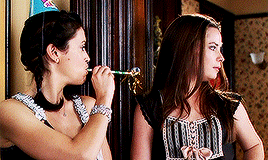
CULTURAL IMPACT
Like many shows on the WB in the 90s, Charmed was very popular with the younger demographic even though its characters were about five years older than they were. Many resonated with the messages of family and female empowerment to the point of making a show a cult classic, even though it wasn’t as critically acclaimed as Buffy or Angel. Up until
Unfortunately, the environment on set was not ideal. Rumors of feuds between Shannen and Alyssa were plenty abound, causing the gossip machine to speculate that the latter’s rise in popularity was the result of the former leaving. Recently, Brad Kern was also exposed for being responsible for a very toxic & misogynistic work atmosphere. It’s a cruel irony, given the feminist tones the show cultivated.
Up until Desperate Housewives, Charmed had the honor of being the longest running TV show with all female leads. It was a truly imaginative show that made its own identity known. I haven’t watched the remake nor do I plan to - I have nothing against the new show and I’m sure it has it’s own highlights, but there’s only one Power of Three for me...
[... and that’s why we’ve truly been Charmed]

WHERE TO WATCH IT
Charmed is available for streaming on Netflix
7 notes
·
View notes
Text
Don’t Like, Don’t Read, A-hole.
I’m Continuing my Tradition of responding to guest reviews here (since Fanfiction.net does not give one that option). However, unlike other time’s I’ve posted a response here, I’m not going to address this reviewer directly, as they’ve lost my respect and thus that courtesy. New Fanfiction Authors out there, if you get this kind of shit in your inboxes, know that it’s NOT in ANYWAY what we mean by constructive criticism and you should not pay it any mind while you’re feeling unsure about your writing.
Fair Warning: This has a few instances of heavily misogynist language in it.
Review Of Chapter 2: The Wizard in White
“From: Hmm (Guest)
Hmm:This story was interesting to a point,… up until this chapter. This chapter honestly really annoyed me, and the pacing of the story is also a key factor. You’ve literally done nothing but make Voldemort seem more powerful than he is, and give him victory over victory.”
The above paragraph is really the only one here with any meaningful information in it. However, by not following through with suggestions/specifics, this person has really failed to transform this into constructive criticism. They also haven’t been specific about what about the pacing is throwing them off. The victory after victory part is also confusing form me, as the writer, because this is a review of Chapter 2, when the conflict of the story is still being established. I will grant that I have so far struggled immensely with the pacing of book 6 and so I was very irritated that they could not articulate what, specifically, was “annoying” about that. (Annoying is also a clue that this critique involves the reader’s personal preference and thus I automatically give it less credibility). The enjoyment of writing may be subjective, but the practice of it really can be objective. Like any argument, you have to have evidence to prove what is and isn’t working on a structural and narrative level…
“Yet the Senshi and the HP world just keep losing out. At this point in time, I’ve already given up trying to find out who Harry was in his “star seed” (a term you used ONCE, then never again). At this point, it feels like the HP cast is just there for you to use and abuse however you want.”
This part again made no sense to me as the writer of the story. 1st of all, both the senshi and the HP characters scored big wins in the previous story. It is only chapter 2 of the sequel (set in book six which was also an incredibly dark point in the war with Voldemort in canon and in no way ended on a positive note). So this person has not in anyway managed to prove their statement. Their annoyance over Harry’s “star seed” is confusing but understandable, as they seem to assume that a star seed makes someone automatically special. This shows that they either only watched the SM Anime, or didn’t read the SM Manga carefully (everyone - even animals - have star seeds in the sailor moon universe). What I can take from it is perhaps that i need to scale back on the tidbits of world integration I throw into my crossover, but that’s really all.
Also: “It feels like the HP cast is just there for you to use and abuse” Well… yeah. From other crossovers I’ve read, it is hard to strike a balance of attention between two universes and I am not even trying to do that here. I’m well versed in both universes, but I have much more concrete ideas for the senshi. the HP characters and world, for me, are much more flexible and I love exploring what they could be. It isn’t everyone’s cup of tea (again, reviewer preference. If anyone ever says this to you in a review, take it with a heavy dose of skepticism).
Harry’s more of a b*** in this story than he was in cannon, and let’s not forget that Neville and Luna has gotten more stage time than anyone!
The b*** part is where I lost the last shred of respect for this person. (and I was already really irritated with this review). 1st of all: that word is not cool. And this has officially crossed the line from harsh review into hate review. 2nd of all. Harry Potter age 15-16 is a jerk. He has good reason to be and he has a good heart, but any reading of the text more than proves he has some really asshole moments. There’s also the fact that the HP books were written from Harry’s perspective, they’re obviously going to favor him. It’s important to consider that in any story where he isn’t the POV character. 3rd of all. It is totally absolutely okay to give more attention to the canon side characters than the canon main. It’s a mainstay of fanfiction. Harry Potter is not entitled to being the hero or the center of attention. While, yes, I am struggling to juggle the 43 odd characters in book six, it’s still inappropriate to gripe about which characters I choose to make the main cast. Maybe I have important reasons for needing to give Neville and Luna more attention (anyone reader who wasn’t obsessed with glorifying Harry Potter might even read that as foreshadowing).
I’m also really annoyed that you pussified Pluto to this extent,… You’ve made her almost completely a POS character with s*** skills that can be circumvented with “wix” magic easier than most.
Again with the swearing and misogynist language - here I have got to say that if I had read this review on one of my stories before I was a college and grad student and before I’d really learned about what misogynist language is and how it functions… I might have read this and quit writing the story all together. I might even have deleted it. I might have given up writing about Pluto all together. And because Pluto is and always has been the senshi I love and identify with most, this review might even have caused me real emotional hurt, by presuming to invalidate my own understanding and personal identification with the character. Since I’m an old, tea-drinking, academic snob now all it does is piss me off and make me label this reviewer as ignorant, misogynistic and lacking in basic human decency. (And that’s all from the use of the word “Pussified.” I haven’t even gotten to POS and S*** yet).
They could have said this in a way that made me listen and said something insightful but they didn’t. So I can’t use this to improve my writing of the character at all. What this reader also misunderstands here is that powerlessness is part of Pluto’s character arc. Because as convenient as it was for me to kneecap her time powers, it also allowed me the opportunity to explore how being a normal, befuddled human in a stressful situation could help her grow as a character. Pluto has 3 main things that she struggles with in the series: How much she should or shouldn’t interfere with time, her desire to connect with and be close to her fellow senshi, and largely under the surface but no doubt a factor is her exploration of her own humanity outside of being a Time Guardian.
So bearing those in mind, it is very interesting on a character level, to explore how she’ll react to failure, to powerlessness, to being as unsure and confused as any of the other people around her. How does a hero react when they lose their powers? What do they learn from it? How does it affect them when they regain those abilities? It isn’t every reader’s cup of tea, true, but there’s no reason to send hateful messages over that. (Don’t like, Don’t read I mean really).
So in summary: this reviewer pissed me off. I want to post this here so that newer authors can read it and know that it is bullshit and their writing and their ideas are beautiful and worth it no matter what haters on the internet try to tell them.
#reviews#harry potter fanfiction#fanfiction review#haters gon' hate#fanfiction problems#fanfiction review problems#fanfiction writing#fanfiction writing problems#writer problems#tw: misogyny#tw: swearing#fanfiction reviews#teitpp#theelephantintheprideparade
7 notes
·
View notes
Text
The History of Wonder Woman
Hey kid, wanna know the history of Wonder Woman? The whole messy lot of it, not just the very start?
Wanna know HOW her books ended up the biggest mess in the entire comics industry? Big clues as to why her movie took so long to make?
It has feminism, racism, sexism, blasphemy, infanticide, and bees...
Wonder Woman was created by Dr. William Moulton Marston, noted psychologist, inventor of the lie detector, writer, and feminist. He secretly lived in a polyamorous relationship with two women who helped him come up with Wonder Woman: his wife, Elizabeth Marston, and Olive Byrne, daughter of the major women’s rights crusader Ethel Byrne (known for helping her sister, Margaret Sanger, to create Planned Parenthood). He was heavily influenced by early-twentieth-century suffragists, birth-control advocates, and feminists.
Even putting aside how jaw-droppingly progressive his woman superhero was, the comics still stand out for how whimsical they were. Wonder Woman/Diana had an invisible plane and a telepathic radio. She jousted on a giant battle-kangaroo, and, like all Amazons, enjoyed deflecting bullets with her bracelets. She fought Nazis, mad scientists, valkyries, mole-men, tiger-ape hybrids, flying mer-sharks, a subatomic army, and her arch-enemy: Mars, the god of war. She regularly battled aliens well before it became common for her peers (including Superman, who in those days was usually taking on gangsters and corrupt politicians). When not kicking back with her mother and sister Amazons she hung out with a short and stout firecracker of a girl called Etta Candy, a slew of college girls, and an Air Force pilot named Steve Trevor that was as disaster-prone as Lois Lane. And while later writers said that gods gave her superpowers under Marston everything she could do was just from training real hard.
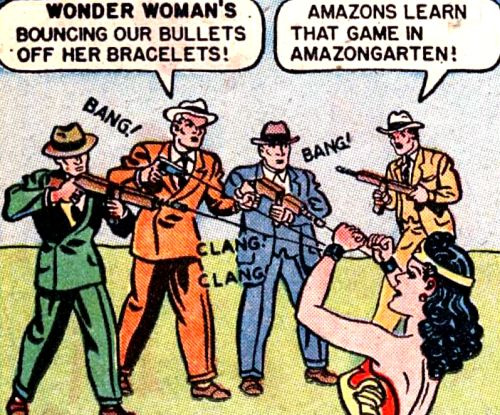
Analysis often puts attention on some elements that are – let’s not beat around the bush – kinky as hell (like the “bondage” aspect of Wonder Woman typing people up and getting tied up), but just focusing on that is a massive disservice to Marston. Early Wonder Woman comics were far ahead of the curve in sheer quirkiness and how progressive they were in their depiction of women (even stating there would be a woman President one day). It certainly helped that s Marston was often helped by his assistant, 19-year old Joye Hummel (I’ll come back to her in a moment), particularly when his health began deteriorating.
Marston put thought into Wonder Woman’s origin. Diana was created when the Amazon Queen, Hippolyta, wanted a child and Aphrodite granted her wish by bringing a clay baby to life. The “artificial woman” is a common theme in religion and mythology, including the most famous examples of Pygmalion and Pandora. Pygmalion was essentially a living gift to a sculptor that the gods liked, while Pandora was clay brought to life by the gods that promptly unleashed all the evil in the world (much like Eve, created from Adam’s rib). Marston could have made Wonder Woman’s father a god (a dime-a-dozen origin for heroes), but instead made her into an inversion of the “artificial woman” trope. Here was a woman made from clay, but she was neither a blight nor a prize to be won; raised by women, she was a hero in her own right. After millennia of blame for all the world’s woes, Pandora got her revenge: Wonder Woman.
How Marston got into comics is a story by itself. At the time, there was a fledgling movement to censor comics (“Dick Tracy is too violent!”). Family Circle magazine published an interview with Marston on the subject, since he was a noted psychologist who had worked for Hollywood as a consultant (the interviewer was actually Olive Byrne, who lived with the Marstons by then and wrote under a pen name). Marston’s defense of comics attracted the attention of DC Comics, who offered Marston a job as an “educational consultant” (wanting to tell any would-be censors that the staff psychologist okayed everything). Marston had offered the opinion that what comics needed wasn’t to censor “violent” heroes but rather to offer nonviolent alternatives, and saw an opportunity to introduce that, as well as to create a prominent female hero. His pitch was a hit - in 1941 Wonder Woman appeared.
Wonder Woman’s use of a lasso tying people up (and getting tied up) certainly boosted sales by appealing to readers that liked seeing a little bondage (including Marston himself). For Wonder Woman to succeed (and for his feminist message to reach male readers), Marston didn’t shy away from titillation. But her heavy use of a lasso wasn’t just a way to attract readers. The frequent imagery of Wonder Woman escaping from ropes and chains provided a powerful image of women escaping their metaphorical bonds. Moreover, it also stemmed from Marston’s desire to offer a less violent hero – Diana lassoed bad guys and explained what they’d done wrong instead of breaking their jaws like Batman or Dick Tracy. Wonder Woman’s compassion was front and center in Marston’s comic, and her efforts to reform her foes were a major theme.
And she certainly had her fair share of foes! Marston came up with a colorful gallery of recurring villains, including Giganta (a gorilla-turned-into-a-woman), Cheetah (think a Kardashian that went crazy and started wearing animal skins while committing crimes), the fascist mad scientist Dr. Poison, the misogynistic mentalist Dr. Psycho, and plenty more.

Marston worked from 1941 to 1947, when he passed away of cancer. Joye Hummel, his assistant, asked to continue writing the book, making an argument like “you know I was writing a bunch of the stories already, right? Marston had polio and cancer; I was doing most of the work near the end.” DC heard her excellent argument and ignored her, giving the book to Robert Kanigher, the book’s editor (making him essentially his own boss), and there’s never been a more disastrous baton-passing between writers in all of comics history.
Kanigher’s Wonder Woman ran from 1948 to 1968. He had co-created The Flash and many other characters, and churned out scripts by the bucketloads, with particular impact on superhero and war comics (including that one with a real-life Confederate general as the hero). But his 20+-year(!) run on Wonder Woman was an unmitigated catastrophe.
The feminist underpinnings of the book were discarded (most egregiously, a section Marston had included in every issue celebrating great women in history was replaced with a section about weddings), and Diana seemed obsessed with Steve Trevor. As Dr. Fredric Wertham led a high-profile moral crusade against comics, DC kept Wonder Woman as inoffensive to 50s sensibilities as possible. Stories pitted her against monsters, mobsters, and aliens (with the occasional story about strange creatures falling in love with her), and while parts campily echoed Marston’s absurdist moments (Dinosaurs in a Department Store!), the core of the book withered. Steve became an “alpha-male” that felt threatened by Wonder Woman’s heroics… and she felt bad about it. While Steve and Hippolyta still showed up, the rest of the supporting cast were forgotten and nobody took their place. The idea that her feats stemmed from Amazon training was dropped – Wonder Woman was given superpowers by the gods (including flight, rendering her invisible plane obsolete).
Kanigher’s frequent time-traveling stories let Wonder Woman team up with her younger self. Thus, for a much of a 20+-year period, rather than building up a solid cast, Wonder Woman was left literally talking to herself. When Robin brought together other sidekicks to create the “Teen Titans,” nobody involved was paying enough attention to realize Kanigher’s "Wonder Girl” was just a younger Wonder Woman. After spotting the error, DC said the Wonder Girl in Teen Titans was a new character (“Donna Troy”), but attempts to retroactively connect her to Wonder Woman underwent so many rewrites over the years that she remains one of the biggest headaches in comics. When people read Teen Titans, they learn that Wonder Woman’s book is confusing.
Despite being on the book for over 20 years, Kanigher’s only notable new characters were Angle Man (a generic recurring mobster), Egg Fu (an evil egg/racist Chinese caricature, see below), Nubia (“what if we made another Wonder Woman, only this time with black clay?”), and Circe (another character plucked from mythology). Of the recurring villains that Marston had created, Kanigher used Dr. Psycho a few times, Cheetah twice, Giganta twice, and… that was about it. At a time when heroes like Batman, Superman, and The Flash were building up villains, settings, and supporting casts, Wonder Woman’s world was shrinking as fast as her peers’ were growing.
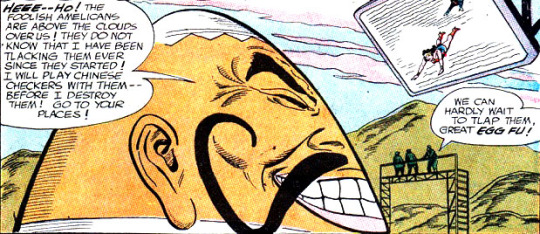
When his run concluded, Kanigher had essentially left Wonder Woman with no notable villains and a supporting cast smaller than when he had inherited the book 20 years earlier. Worse, book’s feminist soul was in tatters. The book was handed off to Denny O’Neil in 1968.
O’Neil, a major Batman writer, was almost as mismatched for Wonder Woman as Kanigher, and his editor wanted drastic changes to improve sales. O’Neil killed Steve (a mercy at that point), depowered Wonder Woman, and gave her an elderly Asian martial-arts instructor – basically trying to turn her into a spy-themed 70s movie hero.
Thankfully that run only lasted only a few years, and from 1974 to 1986 the book was thrown like a hot potato from writer to writer. Nobody stayed, little was built, Steve was brought back to life, Steve was killed again, Steve came back again, the setting was shifted to World War II (because the hot new TV Show was set in WWII), and then back to present day… it was clearly a book in serious trouble.
When Superfriends (the first Justice League cartoon) debuted in 1973, there was no clear major Wonder Woman villain in the books, so the show settled on Cheetah (who had racked up a paltry 9 appearances, including a reprint, in the 30 years that Wonder Woman had been around).
And when Lynda Carter’s Wonder Woman live action TV show came out in 1975, it was a hit that cemented the character’s prominence in American pop culture, but it was set in World War II. Wonder Woman wasn’t the only hero to be created in WWII, but hers was the only comic with its glory days so clearly in the past.
In 1986, DC rebooted their entire line of comics, wanting to start from scratch, updating and streamlining the best of what came before. Wonder Woman was given to George Perez (and Len Wein), and his brilliant run took the most iconic and well-known elements of the character, making it all work. He brought back Etta Candy and made Steve Trevor into a likable human being. The Amazons were fleshed out and given flaws and foibles. He plucked villains from the book’s distant past (Cheetah and Dr. Psycho, now revamped to be foes worthy of a Superman-level hero), and retooled a few of the more recent ones that had potential, like Circe. He showed that at least some Amazons were gay (in 1986!), and found a way to visually combine the classic Wonder Woman costume with more accurate Grecoroman soldier styles. If you’ve ever seen Wonder Woman dressed like a “warrior,” you have Perez to thank.
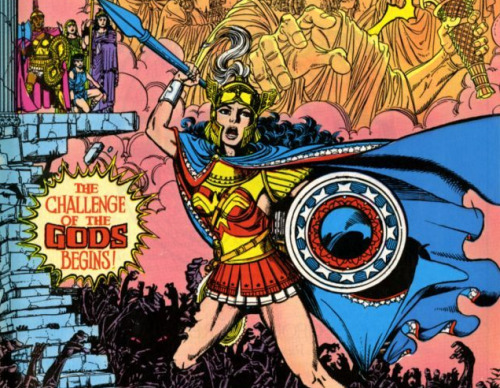
And while Wonder Woman remained compassionate, Perez showed that when there were no other options his Amazon warrior was willing to use lethal force.

Hippolyta and the Amazons were reimagined with a greater emphasis on actual Greek mythology, but at the same time were presented as a mutiracial tribe (of particular note, Perez introduced the black Amazon general Phillipus, who would be presented as Diana’s teacher and Hippolyta’s closest friend).

The difference between them and Amazons of myth was explained as being due lies told to make Hercules look good – in DC’s world the famous Greek demigod had actually deceived, raped, and enslaved the Amazons before they overthrew him and withdrew from the mortal world. In the “starting from scratch” new universe, Diana was written as having just left the Amazon island of Themyscira for the first time, finding a new home in Boston with Julia Kapatelis, Curator of the Museum of Cultural Antiquities (a great friend for an “ancient Greek” suddenly finding herself in the modern world!). Vanessa’s teenage daughter went on a few Wonder Woman-related adventures, and it looked like she was going to become a new (and less confusing) “Wonder Girl”. And Perez brought back the god of war (calling him Ares instead of Mars), who had been virtually absent since Marston’s run. That last bit’s incredible when you consider the villain was clearly her arch-enemy in the early days… imagine if Joker or Lex Luthor had been missing for decades. He also sought to end the cycle of writers not knowing what to do with Steve Trevor – Steve and Etta got engaged.
Then the book was handed to William Messner-Loebs (WML), who wrote it from 1992-1995. Sadly, it squandered almost everything Perez had done. Right at the start it threw her in space, abandoning the cast that Perez had introduced, and when she returned the Kapetalis family was nowhere to be seen. Perez had left one instruction when he left the book – Steve and Etta were to get married. WML had Etta appear a few times (long enough to make the always-comfortable-about-her-weight character bulimic), then wrote her and Steve out of the book without ever showing their wedding (a broken promise that resulted in Perez being furious with DC comics for years).
The Amazons of Themyscira were dropped into another dimension for years (and for most of that time the readers were led to believe Themyscira had been destroyed, so the reveal that it was in another dimension may have been a panic-driven last-minute change). A series of stories showed Wonder Woman trying to have a “normal” life, like holding a minimum wage job at a Taco Bell knockoff (bear in mind she had no secret identity – everyone knew she was Wonder Woman). Notably, he created a gritty new Amazon named Artemis that briefly became Wonder Woman, died, and came back because Wonder Woman desperately needed supporting cast members. Although he added little that was truly bad, WML had cost the book all the momentum and stability that Perez had given it.
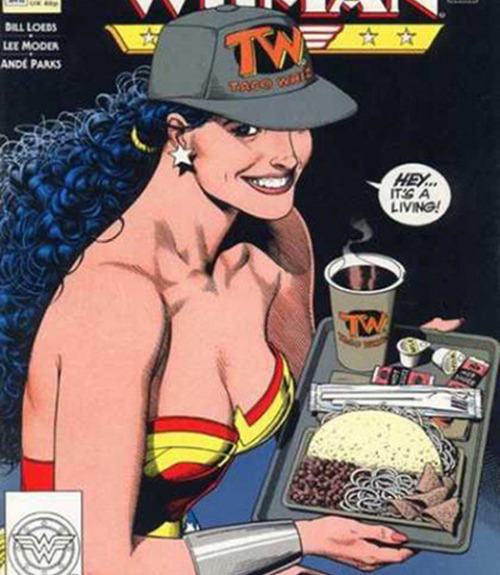
He came up with a gritty new Amazon warrior called Artemis that briefly became Wonder Woman, died, and came back because Wonder Woman desperately needed supporting cast members. Although he ADDED little that was truly bad, WML had cost the book all the momentum and stability that Perez had given it.
John Byrne took over from 1995-1998, and set the tone by slaughtering half the Amazons at the start. His run had little good in it, but wouldn’t be too bad if not for a few things. First, he made a more confusing mess out of Donna Troy (the Teen Titans’ Wonder Girl). Second, he tried to make a flawed hero out of Hercules (established as a rapist in the Perez run). Third, he felt that since the Wonder Woman TV show had been set in World War II there needed to be a Wonder Woman in WWII, even though we’d already seen that the “start from scratch” Wonder Woman’s first adventures were in the modern days. Byrne had Hippolyta, Wonder Woman’s mother, go back in time to become the Wonder Woman of WWII, making her the first Wonder Woman and Diana the second, and if you think that seems really unnecessary then I hope you can go back in time to tell Byrne not to do it. Lastly, he shoved Steve, Etta, and the Kapetalis family even more firmly out of the book by having Diana move (to “Gateway City”), and came up with a “Wonder Girl” that was the teenage daughter of a museum curator specializing in Greek antiquities. Since she was a blatant photocopy of the character that Perez had created to become Wonder Girl, it’s unclear why he didn’t just use Perez’s character (the pattern of Diana’s supporting cast failing to get traction has never stopped).
The book was given to Eric Luke from 1998 to 2000. I’m not 100% certain why he got the axe mid-story, but I can guess - Wonder Woman met Rama, a major Hindu god (who was wearing a leather Korn jacket… a no-no for a Hindu god). They teamed up to fight the Greek god Chronos, who had already defeated the Greek and Hindu Pantheons and was waging war on Christian heaven. Furthermore, there were hints at romance between him and Wonder Woman, even though Rama is married in Hinduism. Perhaps someone in authority felt that the book had wandered into a religious minefield.

Phil Jimenez’s run lasted from 2001 to 2003. He liked the idea of Wonder Woman being the UN Ambassador representing the Amazons and tried to do something with that (for the first time since Perez), and fleshed out the Amazons by showing some of the conflicts between different groups. He implied that Phillipus (Wonder Woman’s Amazon mentor) was in love with Wonder Woman’s mom. He made an effort to draw from all eras of the book’s past (even Kanigher’s – the generic mobster “Angle Man” became a surprisingly enjoyable thief armed with a device that could turn his surroundings into an M.C. Escher drawing). The Kapatelis family from Perez’s run returned. Jimenez’s major new addition to the cast was a new boyfriend by the name of Trevor Barnes, who was killed by a fill-in writer the minute Jimenez left the book (Wonder Woman is not allowed have a consistent supporting cast). And due to the U.N. elements, Diana moved to D.C. (she’s not allowed get a consistent city either). He certainly made missteps - such as replacing Wonder Woman’s best-known original foe, The Cheetah, with a male character by the same name, so for a while this was a thing...

And for some reason Jimenez made a point of bringing up that Wonder Woman was a virgin. But overall, his run stands out for its sustained effort to build up Wonder Woman’s cast and villains, bringing back old favorites from all eras of the book.
Greg Rucka tried to build on the Perez-Jimenez idea of Wonder Woman as an Ambassador from Themyscira. She got an embassy staff as a supporting cast (complete with a Minotaur chef), and the embassy was given a teleportation portal to Themyscira, making it easier than ever to juggle the Amazon and non-Amazon parts of Wonder Woman’s world. Classic villains like Dr. Psycho and Cheetah (female) showed up, along with modernized takes of figures from Greek mythology. It was getting rave critical reviews and had stabilized many elements of her world, but DC decided they had an idea that would boost sales even more (spoiler: they were wrong) so they pulled the plug. The Amazons were yanked into an alternate dimension in a big crossover event and the embassy closed. Diana lost her supporting cast. Again.
DC’s big idea was a major overhaul by TV writer Allan Heinberg… whose run had so many delays that it started in 2006, ended in 2008, and was just five issues long. While Jimenez and Rucka had started to give Diana back stability in her supporting cast and made an effort to dust off and properly revamp some of her enemies, Heinberg went in the opposite direction, throwing villains at her without explanation for who they were, and giving Wonder Woman a whole new cast and a secret identity… as a superspy, drawing on O’Neil’s comics of the 70s of all things. Bear in mind that Wonder Woman had never had a secret identity after her 1986 reboot. Also keep in mind that having a superhero’s secret identity be an adventurous government agent with high-tech gear gets redundant fast. Although Heinberg’s run was a mess and he basically decided that as a TV writer he didn’t need to hand in comic scripts, it’s worth nothing that he has the sole screenplay credit for the new movie. Clearly, he did have a blockbuster Wonder Woman story in him – it just took a while to get it out.
The book was handed to Jodi Picoult, an acclaimed novelist that had never written comics before. It was the first time a woman was (openly) assigned a lengthy stint on Wonder Woman. But rather than let her learn the ropes and give her a chance to show her own vision of Wonder Woman, DC started a multi-title crossover event headed someone else. The event was called “Amazons Attack,” and Picoult was left to follow the lead of Will Pfeifer, a man who had never written Wonder Woman before, and whose knowledge of the character was apparently nonexistent.
The Amazons returned, but Diana wasn’t given a chance to enjoy having her cast back, because they immediately started a nonsensical war. It featured misandrist Amazons that killed defenseless children in cold blood for being male, plot-holes you could drive a truck through, the Amazons trusting Circe (think “Commissioner Gordon agreeing to make The Joker his deputy”), Batman being the one to (easily) defeat Circe, a wtf twist ending that told readers to pick up a non-Wonder Woman book, all leading up to the Amazons being taken out of Wonder Woman’s cast yet again – this time giving them amnesia and spreading them across the world where Diana could never find them (and in another book Pfeifer turned Angle Man from a likable rogue with interesting powers to a pathetic depowered misogynist – a good example of how Wonder Woman’s villains can’t catch a break either). It literally lost track of where characters were and what they were doing from one issue to the next, lost track of characters’ motivations in the story, contradicted itself on what characters could do, and tarnished Wonder Woman’s cast like nothing written before. Amazons Attack was DC’s first (and to-date only) big multi-book event revolving around Wonder Woman, and it’s best remembered for being awful. And for this:
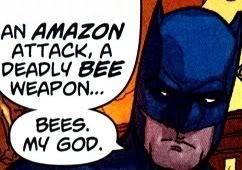
After being forced to work on that, Piccoult walked away from DC and likely comics as a whole (she’d been greeted by the very worst that the industry has to offer). The book was given to Gail Simone, whose run lasted from 2007 to 2010. She made an attempt to use the spy agency supporting cast left by Heinberg. While the book was often plagued by writers not using the supporting cast left by the previous writer, Simone may have been the only writer who probably should have dropped what she’d been left. The pseudo-Agent of SHIELD secret identity failed to gel, even when Simone brought back Etta Candy. Unfortunately, Etta was one of very few things that Simone brought back – her run made heavy use of characters from other books, including characters from Flash, Green Lantern, and an obscure sword & sorcery book from 1975. Wonder Woman’s own supporting cast and villains remained in terrible shape. Simone started finding her footing (bringing back the Amazons and setting the stage for a wedding between two of them – Hippolyta and Phillipus, Wonder Woman���s mother and mentor!) when she was taken off the book in favor of another famous TV writer with his own vision.
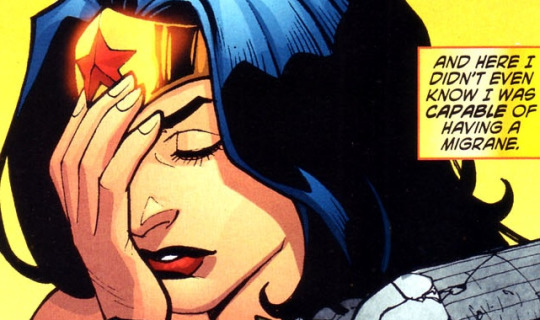
J. Michael Straczynski rebooted Wonder Woman in an alternate reality where things had happened very differently (for one thing, Wonder Woman wore pants!), the Amazons were all but extinct, and there were a couple interesting things in his run aaaand The End. Less than a year in, DC reassigned him to things they thought would be more profitable.
The book was turned over to hardboiled crime series writer Brian Azzarello, who rebooted it yet again. An argument can be made that his run is more accurate to Greek myths, but only in the most cynical ways. The most egregious moment in his run was when he “revealed” that the Amazons regularly sneaked up on boats, pretended to be helpless women lost at sea in order to get on board, seduced the men, slept with them, then massacred the defenseless crews in their sleep. If any male babies resulted from that, they were sold to Hephaestus to be slaves (with the story stating that if they didn’t have the slavery option, the Amazons would just throw the male children off a cliff).

Now say what you will about the Amazons of myth, but they didn’t go around seducing anyone. They just straight-up charged into a village and killed people – evil, yes, but completely honest about what they were. Azzarello seemed to have merged the myths of the Sirens and Amazons and tried to create something even nastier. He basically looked at two of the most misogynistic stories in Greek mythology and went “hold my beer”. To really put this in perspective, keep in mind that in all the decades that Wonder Woman has been around, the Amazons have basically been the only remotely stable element in her supporting cast. What Azzarello did was essentially the same as a new Superman writer declaring that the entire staff of the Daily Planet had secretly been in a child sex ring all along. He also turned the Amazons to stone because Wonder Woman doesn’t get a consistent supporting cast. Ever. Additionally, he decided that the whole “clay baby” thing didn’t work for him, so he redid Wonder Woman’s origin to say she’s one of those millions of kids Zeus sired – her powers, thus, were owed to her father (he also scrapped the idea of Wonder Woman’s learning her skills from Phillipus and the other Amazons, and had her learn from Ares, meaning that she owed both her power and skill to male gods). So, after several decades, Marston’s deliberate attempt to flip the script of Pandora was discarded in favor of making Wonder Woman into a she-Hercules or Percy Jackson. And, spoiler alert, the movie seems to use his idea. It’s possible the sequel will go “nope, just kidding!” (one can hope), although I wouldn’t put it past the company behind Superman v Batman to double down and put in Azzarello’s reimagining of the Amazons.
Azzarelllo’s 2011-2014 run has its fans, but whatever the merits of his tale as a self-contained story I would argue that it was very bad for Wonder Woman overall, by further tarnishing the Amazons and continuing an alarming trend of making nothing in her book consistent over time. Moreover, while he was focusing on his new characters and Greek Gods, he had no time for Wonder Woman’s other supporting cast or villains. Thus, in the new rebooted DC universe they ended up being rebooted in other author’s books, often in ways that made them far less compatible with Wonder Woman’s own stories. Last I checked, most of them are still twisting in the wind, lacking basic origins and motivations in their new incarnations.
While it’s fantastic that the movie makes people excited about Wonder Woman, I do have to worry that it compounds some of the problems Wonder Woman has. To be clear, that’s not knocking the movie. Most books wouldn’t be negatively impacted by tinkering in adaptations, but DC’s mismanagement has left Wonder Woman’s book uniquely unstable. The movie has Steve and Etta (two major supporting characters) alive in WWI, meaning they’d be absent from any Wonder Woman movies eventually set in modern times. It also uses an origin that’s six years old, that contradicts the one that had been in place since 1941, and is thematically at-odds with the character. There’s room for different interpretations with adaptations of course, but I’m certain that Marston would hate the new origin, and I don’t think the first ever Wonder Woman movie should include something as fundamentally at-odds with her creator’s vision (and the majority of her publication history) as having her powers come from a father.
I haven’t followed the books since Azzarello (really, DC couldn’t have driven me away harder if they’d tried), but from what I’ve gathered Wonder Woman is still Exhibit A for why these decades-old characters should really just be in the Public Domain at this point and not owned by corporations.
This isn’t a story with a happy ending, I’m afraid. It’s the story of how badly this industry has treated its favorite daughter. Perhaps we’ll have to make a happy ending ourselves.
162 notes
·
View notes
Text
Persona 5
Last night, I finally finished Persona 5, and...it wasn’t as good as Persona 4. Now that I have all the available facts, I finally think I can fairly unpack my reasons why. Behind the cut, for anyone else who’s still working on it and doesn’t want spoilers.
The first thing to note is that I am a huge Persona 4 fan. It’s not a perfect game (but then, nothing is); it starts off very slowly, its once-lauded LGBT content is actually not good in the cold light of day when LGBT content is (however slowly) becoming more common in video games, and it has a long, LONG day that is just...awful. Misogynist and transphobic as hell. But overall, it’s a hell of a game that I recommend to almost anyone, even with those caveats. It’s also a game that’s almost 9 years old, so why do I think it’s better than the sequel that came out this year?
Certainly, Persona 5 has a lot of gameplay improvements. There’s more variety in combat, with new types of attacks and status effects you can inflict and have inflicted on you. Adding guns as another piece of equipment gives everyone in your party additional options. Most importantly, the social links the current Persona games rely on for their flavor have added gameplay benefits, as different ranks will grant you useful skills in and out of combat, at a pace that lets you naturally integrate the new options rather than being overwhelmed by them. And the negotiation system with the enemies (imported back from the base SMT series) means that what you fight can matter beyond “this is their weakness/XP gain/possible item drops.” In every measurable way, combat in 5 is better than 4. Even the dungeons are improved, because the set designs stand out better than 4′s randomized crawling. Plus if you do want random dungeon crawls, there’s a whole huge area that calls back to Persona 3′s Tartarus. The best of both worlds, right? The problem is that while combat in 5 is a great improvement, combat is not what I loved in Persona 4 anyway. It was the writing and the story.
If you haven’t played Persona 4, the main plot revolves around a series of murders in a rural Japanese town. After the first two, the main character and his recent friends discover another world, and that it’s connected to the murders so far. When a third person goes missing, they save them, and then decide to work on stopping any further murders and figure out who’s behind them. On its own, this is a workable plot that stands out among JRPGs for being decidedly small scale. You aren���t setting out to stop an evil empire or find your missing father, but it’s a worthy goal, and the fantastical elements explain why you can’t just go to the police about it.
What makes the game sing is the writing for the other members of your group, and for the social links you make to gain power. Your party is a bunch of teenagers, and sometimes they’re, well, shitty in the way teens so often are. They care for each other and stick their necks out, but they’ll also crack inappropriate jokes or be insensitive because they’re still learning how to act like adults. It occasionally goes too far (see Teddy), but mostly it felt believable, as did any of the romance scenes if you choose to date any of your classmates. On top of that, with the exception of the main character, you gain team members by saving them from their own Shadow, which stands for the parts of themselves they don’t want to admit are real. Sure, you beat them when they become the boss, but then the character in question has to accept the parts of themselves they don’t like to admit are there, something that all of us have.
Meanwhile, the social links do the heavy lifting of making the town feel like a real place. Sometimes you’re doing real work to improve someone’s life, sometimes you’re just there for them when they hit a snag and need to process it. But it’s a reminder that outside of the fantasy elements of going into the TV world and fighting weird creatures, you live in a town with “real” people that have real problems. That’s not quite what your team member’s social links are about, but instead it’s about someone who has admitted they have issues...and then you have to help them work through that. Admitting they have a problem is just the first step, not the solution.
If this sounds more like a review of Persona 4 than 5, I can understand that. But I needed to unpack what I love about 4 first, because if I’m going to say 5 isn’t as good, I think it’s only fair to explain what I love about 4 and why. And the main stumbling block for 5 is a combination of writing and, to a lesser degree, a mixed translation job.
The translation isn’t terrible-I don’t think it will spawn any memes online due to particular lines. But some subtlety is lost, and lines that should hit harder lose impact because the sentence structure doesn’t work as it should in English. It’s hard to say if it’s just a case of being too literal or being rushed for time, or some combination.
But even with better translation, the writing just falls flat. 5 raises a lot of questions with its central premise, where your group “steals” the hearts of bad people to make them change and be good, but it’s resolutely uninterested in answering half of them. It will tell you all about the mechanics of how you do it and what happens to the person, but it doesn’t want to deal with the ethics at all for half of the game, and then when it comes up, it’s a half hearted ‘were we doing the right thing?” when people start saying bad stuff about the Phantom Thieves. Are all the villains you take down engaging in truly reprehensible behavior? Yes. Are they largely insulated from official control? Yes, and for reasons beyond general “looking the other way,” since the final human villain is revealed to be covering for everyone you fought before. But there’s never a conversation where your group, the people actually altering people’s personalities, ever ask themselves if it’s okay to be making such radical changes, or asking if you are returning them to normal versus changing a “normal” person into a different version that didn’t exist before. And even the half hearted attempts to question it get shot down by your character’s mouth piece, the fame whore, whose very questionable motivations for wanting to continue are ALSO never questioned, except very briefly near the end. I didn’t need the game to tell me I was wrong for what I was doing, but I at least wanted a discussion, even if it ended with “this may be a bad thing, but we need to do it because no one else can touch them.”
Perhaps the social links would have saved it, but almost all of them outside of the main party ones end the same way. You get up to rank 7 or 8, find out there’s a road block of someone being bad, and then you get a request to change their hearts. Rinse and repeat. This throws the question of how ethical your behavior is into even sharper relief, and adds in the issue of making every resolution to the social links be “I did magic, and then they figured out I was a Phantom Thief, but it’s okay because they said they would keep my secret.” The first few times, I found it charming. The 10nth time, I felt like I might as well stop pretending and just tell anyone who asked “Yeah, I’m one of them. Want me to change some guy’s head? I got my magic gun I can use.”
Most of the party member social links don’t involve that, but most of them also fall flat. Ryuji’s is just there, Ann involves helping her realize other models can be mean and she’ll lose out if she doesn’t put more effort in, Yusuke is having art block, and Haru needs to learn how to manage a corporation she unexpectedly inherited. None of them are offensive, but they’re mostly boring. Only Futaba (trying to reacclimate to society after being a recluse for years) and Makoto (mostly forgettable but she slaps another girl and then challenges a would be pimp to a street fight, which was great) stand out, or seem like you actually do anything to help other than be there as they talk it out on their own.
Then there’s the framing device, where you’ve already been captured and are telling a prosecutor the story of how you came to be the Phantom Thieves. It intrudes every time you hit a certain point in the plot, and whenever you start a new social link. It didn’t take long at all for me to roll my eyes every time it intruded to remind me I wasn’t ACTUALLY in May, I was just RECOUNTING what I did in May. Plus its plot hook of “someone betrayed you to us” was blunted when the person who did it joined my group last and was literally blackmailing us to quit after pulling “one last job.” Gee, wonder who could have sold us out to the cops? The shitty teen detective who talks about people as vermin? I’M SHOCKED.
Now, I will give 5 credit, it has two solid plot twists. The first is when the framing device resolves (assuming you don’t get the bad ending), and Akechi shoots you...only to be revealed that your team was actually paying attention, realized he was lying, and used what they knew about the Metaverse to trick him into shooting a dupe. It wasn’t worth the hassle, but it was nice to see the group not be idiots. The second, that Igor was actually a fake as well and behind all the trouble, was more genuinely surprising, but it did make the voice change that we’d assumed was a weird miscast into a clue that we’d missed.
The final boss fight being about pulling out a giant spirit gun and shooting a god in the head was goofy as hell, but unintentionally so, which is unfortunate.
Would I recommend Persona 5? With reservations. Along with all the issues I’ve noted, the game feels too long for the plot it has; I was close to 150 hours when I finished, and even taking out the grinding I did at different points, I felt like I went through a lot of filler dialogue to get there. Plus the opening to 5 is, if anything, even LONGER than 4. You show up in town on the 9nth, and it’s not until the 18nth that you have full control over your actions, with multiple mandatory tutorial sections.
At least the music is still great.
4 notes
·
View notes
Text
GUESS WHAT DAY IT IS
OSCAR TRIVIA DAY THAT’S WHAT
(SORRY ‘BOUT IT!)
This is the first time in Oscar history that Best Director and the four acting categories (and Best Picture, Screenplay, Cinematography, and Editing) have at least one nominee of color. Definitely an improvement from two straight years of #OscarsSoWhite.
Future Best Picture-winner La La Land has now tied with All About Eve (1950) and Titanic (1997) for most nominations in Oscar history. It’s probably safe to say if it loses Best Picture, it’ll be the largest upset ever.
Tanna is the first Foreign Language Film nominee from Oceania.
Kubo and the Two Strings is the first animated film to be nominated in Visual Effects since The Nightmare Before Christmas (1993).
With her nomination for Fences, Viola Davis is now the most nominated black actress in Oscar history, with three nominations. Yikes.
Another yikes: Octavia Spencer is the first black actress to be nominated after winning an Oscar.
A third yikes: Jackie composer Mica Levi is the first woman nominated in Best Score since 2000.
Meryl Streep, obviously, extends her own record: at twenty individual acting nominations, she remains the most nominated actor in Oscar history.
Abusive racist, misogynist, and anti-Semite Mel Gibson now has the largest gap between his Director win (1995′s Braveheart) and followup nomination (this year’s Hacksaw Ridge).
This is the first time that three women of color are nominated in the same acting category (Supporting Actress).
Additionally, this is only the second time ever that all five Supporting Actress nominees come from Best Picture nominees. The first (and last) time this happened was 1988.
If 20-year-old Lucas Hedges (Manchester by the Sea) wins Supporting Actor, he’ll be the youngest winner in that category’s history, edging out the current record-holder Timothy Hutton (from 1980′s Ordinary People) only by a matter of a couple months.
Weirdly, this is the first time ever that more than one Mickey Mouse Club member has been nominated in the same year. This year, we have Best Actor nominee Ryan Gosling and Best Song nominee Justin Timberlake.
Isabelle Huppert (Elle) is the third actor to be nominated for a French-language performance in a film that received no other nominations. She joins Isabelle Adjani (The Story of Adele H., 1975) and Marion Cotillard (Two Days, One Night, 2014).
This is the fifth year running that at least one actor received their seventh nomination--this year, it’s Jeff Bridges (Hell or High Water) and Denzel Washington (Fences). Since 2012, the new members to the 7-timer’s club have been Robert De Niro (Silver Linings Playbook, 2012), Judi Dench (Philomena, 2013), Robert Duvall (The Judge, 2014), Cate Blanchett (Carol, 2015), and Kate Winslet (Steve Jobs, 2015).
Bradford Young (Arrival) is the second black cinematographer to be nominated, following Remi Adefarasin (Elizabeth, 1998). Since Adefarasin is British, however, Young effectively becomes the first African American to be nominated in Best Cinematography.
It’s been eleven years since August Wilson (Fences) died, making it the longest gap between a death and a posthumous nomination.
Michelle Williams (Manchester by the Sea) so far has the most nominations for an actor born in the 1980s. This is her fourth nomination.
Similarly, Dev Patel and Lucas Hedges are both the first actors born in the 1990s to receive an Oscar nomination.
Aaron Taylor-Johnson (Nocturnal Animals) is the eighth actor ever to win the Golden Globe for Supporting Actor and fail to be nominated at the Oscars. The last time this happened? 1976.
Natalie Portman (Jackie), weirdly enough, continues her streak of being nominated every six years (2004, 2010, 2016). I guess we’ll next see her in Melania in 2022.
Manchester by the Sea is the first Best Picture nominee ever to be distributed or co-distributed by a streaming service--in this case, Amazon. Viva la future?
Four of the nine Best Picture nominees are told primarily from the perspective of people of color: Fences, Hidden Figures, Lion, and Moonlight.
Amy Adams’ snub for Arrival was one of the most talked about and surprising ones of the year. Ironically, this makes Arrival the only Best Picture nominee without an acting nomination.
Michael Shannon (Nocturnal Animals) received his second nomination this morning. He was nominated despite being snubbed by the Golden Globes, SAG, and BAFTA. Coincidentally, the exact same scenario occurred for Shannon’s first nomination, for 2008′s Revolutionary Road. He is only the second actor ever to be nominated twice despite missing out at the Globes, SAG, and BAFTA both times. The only other? Oscar-winner Marcia Gay Harden.
I, Daniel Blake is the first BAFTA Best Film nominee to be completely shut of the Oscars since 2000.
Deadpool is the first PGA nominated film ever to be completely shut out of the Oscars.
Switzerland and the Netherlands have joined Brazil, Japan, France, and Spain as countries that have delivered foreign language nominees to Best Animated Feature. My Life as a Zucchini comes from Switzerland, while The Red Turtle comes from the Netherlands (though to be fair, there is no dialogue in it).
With Nicole Kidman’s nomination for Lion, this is the ninth year running that the Weinstein Company has gotten at least one nomination for Supporting Actress.
La La Land received nominations for both Best Actor and Best Actress (Ryan Gosling and Emma Stone). The last time a musical achieved this? 1954, when both James Mason and Judy Garland were nominated for A Star is Born.
Moonlight is the second film ever to get nominations for both Supporting Actor and Supporting Actress and have both actors nominated be black. The first was Dreamgirls.
For the first time ever, four of the five films nominated for Best Documentary Feature were directed by black filmmakers: Ezra Edelman (O.J.: Made in America), Raoul Peck (I Am Not Your Negro), Roger Ross Williams (Life, Animated), and Ava DuVernay (13th). DuVernay is the first black woman nominated in this category.
Moonlight’s Barry Jenkins is the fourth black director nominated in Best Director. He joins John Singleton, Lee Daniels, and Steve McQueen.
In another first, Moonlight’s Joi McMillon is the first African-American woman to be nominated for Film Editing.
Three films nominated for Best Picture have black producers: Fences (Denzel Washington), Hidden Figures (Pharrell Williams), and Manchester by the Sea (Kimberly Steward).
If Damien Chazelle (La La Land), Barry Jenkins (Moonlight), or Kenneth Lonergan (Manchester by the Sea) win Best Director, it will be the first time since 2009 that that category’s winner is American.
If either Denzel Washington or Viola Davis win for Fences, they will be the tenth (and eleventh) actors to win a Tony and an Oscar for the same role. Already in the club: José Ferrer (Cyrano de Bergerac), Shirley Booth (Come Back, Little Sheba), Yul Brynner (The King and I), Rex Harrison (My Fair Lady), Anne Bancroft (The Miracle Worker), Paul Scofield (A Man for All Seasons), Jack Albertson (The Subject Was Roses), Joel Grey (Cabaret), and Lila Kedrova (Zorba the Greek).
Not trivia per se, but the theatre had a strong showing this year. Among the Oscar nominees of 2016/17 are playwrights Tarell Alvin McCraney (Moonlight), August Wilson (Fences), Kenneth Lonergan (Manchester by the Sea), composer/lyricists Lin-Manuel Miranda (Moana), Benj Pasek (La La Land), Justin Paul (La La Land), Tony-winning actors Denzel Washington and Viola Davis (both coincidentally reprising their Tony-winning roles in Fences), and Tony-nominees Michael Shannon, Meryl Streep, and Andrew Garfield.
26 notes
·
View notes
Text
THE SIX THATCHERS: the deliberate flaw of an otherwise brilliant episode
This post is:
an explanation of the episode from my viewpoint
a review
an analysis of Mary’s character and its point in the narrative
a comparison with previous episodes
an analysis of the dynamics of the third series
my eternal faith in Moftiss being restored again
basically a lot of things
There are only two problems in the Six Thatchers or, better, two categories of problems. The first could be avoided and unfortunately caused frustration to both avid fans and more neutral viewers. The second is deliberate, not because Gatiss wanted necessarily to confuse the fandom, but simply because it couldn’t be avoided and it would longterm serve the main plot. Allow me to explain:
The first problem is the direction. To be completely fair, direction is not always bad and I certainly do not mean the imagery (the shark scene after Mary’s death is a piece of art). It certainly improves after the middle of the episode. But the first half of TST is a crazily paced, exhausting editing or perhaps butchering of various different scenes that the viewer would probably wish to enjoy for a little longer. I understand that the episode had to deal with a lot of different threads of the plot (the present and the past) but perhaps it would be a wiser choice to get a few extra minutes like they did with the Final Problem. The fast pacing doesn’t allow us to feel engaged in what is going on or get once again properly attached to the characters. It also complicates our earnest efforts to understand the plot, especially since TST is in no way one of the easiest Sherlock stories to grasp. I include in this category a slight fall I might have noticed in the chemistry amongst all the actors - hopefully it’s because of the lack of undisturbed screentime together.
The second flaw is the cause of all the chaos in the fandom and beyond, the cause of all the vastly different theories and the cause of all the contradictory reviews. I think I might have never seen another movie or TV episode get so many 2 star and 10 star ratings at the same time!
Well, without taking into consideration personal tastes (i.e. how much someone invests in Mary being a villain) the main objective problem that has caused all the mess is this one: TST does not follow the plotline of His Last Vow. It does not bind well or even barely fits in the concept of HLV. It does not answer the questions His Last Vow raised. But you know what? No first episode of any Sherlock series ever did.
A Scandal In Belgravia ended the pool scene of The Great Game in a rushed messy way and continued without ever bringing this issue back or analyzing Moriarty’s behaviour at the pool.
The Empty Hearse joked around and frustrated the fans by completely avoiding to explain what truly happened in The Reichenbach Fall.
The Six Thatchers focused on Mary’s ambiguous character. Offered insight into her past and the ghosts haunting her, the inevitable conclusion of the life she chose and completed her story arc (?) with a, honestly, beautiful redemption scene. But, as ever, remained silent as to why really Mary shot Sherlock, why she was so terrified of Magnussen’s blackmails if she truly believed the rest of the agents had died, why she always looked so alarmed every time Moriarty’s name was mentioned. Basically remained silent about everything that truly confuses and intrigues the fandom - Why?
Could it be that Moftiss are so bad at creating decent first episodes? Nah.
I have made a post about it: The decompression of the Sherlock cliffhangers has not started yet. It’s the same old thing happening once again with The Six Thatchers.
What I think must be accepted is that Mary was never meant to be a main character. She was never meant to be a main villain either. She’s technically not even the main villain in her villain episode where the official Big Baddie is Magnussen and, then, both of them get beaten in a battle of impressions by an MP and a bad video of Jim Moriarty.
In my opinion, there is a nuance that is almost never discussed: Mary’s character is not as important for the story as Mary’s involvement to what maybe is what we call the main plot. What I mean is that Mary as a character couldn’t stay longer, she shouldn’t stay longer, because this would inescapably lead to an imbalance of the successful concept BBC Sherlock’s showrunners had and A.C. Doyle had before them. Even if Mary was meant to be a Big Villain, this would be a rather quaint twist of the story. In case the show ends in a romance, this suggests that Gatiss and Moffat couldn’t think of anything else but make every woman or romantic antagonist a villain just to desperately defend that Sherlock and John’s relationship is a good concept. I’m fully aware Mary being a villain is one of the most popular and beloved theories but excuse me for saying that this kind of plot twist seems a bit childish to me. In my opinion, they have already made villains (canonically established villains) romantic antagonists but if they also made a romantic antagonist obligatorily villain by default, this would be laughable at the least and would expose Moftiss’ panic to prove that this gay relationship is good and ideal. And that’s my problem. You should never need to prove such a thing, let alone make a (female) character look bad so that your love story can look better. In whatever way I look at it, it’s a bad idea.
So why did they introduce Mary in the first place?
Mary’s introduction was the best (or least bad) idea for Series 3. You need to have in mind that there is an ongoing basic plot. If the plot is heavily dependent on characters such as Jim Moriarty, Mycroft Holmes or even Sherrinford, then Gatiss and Moffat couldn’t proceed with it in the third series. If Jim Moriarty returned back from the dead at the same time with Sherlock, the plot would end up ludicrous. If Mycroft Holmes revealed his ulterior motives in Series 3 or if there was the main villain introduced for the first time at this point, the character development of Sherlock and John wouldn’t be able to catch up on time. In other words, if the Main Villain appeared in, say, The Sign of Three, the viewers wouldn’t be able to buy the importance of the character or understand what makes this villain comparatively more impactful on Sherlock and John’s lives than Jim Moriarty was in seven episodes. Whether Moriarty is alive and the main villain or not, Moftiss needed the time to build up the expectations of the viewers and also develop Sherlock and John’s relationship accordingly for a next level of drama. In short, they needed a break in which they would focus on Sherlock and John and refresh the need and the interest of the audience for a specific, consistent plot. They want to top their own game.
But the plot shouldn’t go back to what Series 1 was because then Series 4 would give the impression that it jumped out of nowhere. Moftiss didn’t wish lack of plot for Series 3 - they wanted it to be subtle and eventually build the expectations for the very dramatic and plot-wise specific Series 4. So they still had to move on and change the data between Sherlock and John. That’s where Mary got in. Mary is the most important feature of the most understated part of the plot. Admittedly, this means something that some people hate; Mary’s character was used for the sake of Sherlock and John’s relationship. True, but it’s unfair to call Gatiss and Moffat misogynists for that. Technically, 95% of the characters and plot points in BBC Sherlock first and foremost affect Sherlock and John’s relationship. Since the core of this show has always been the relationship between Sherlock and John, it is absolutely normal that most parts of the plot orbit around them and there is no need to wave fingers and call everything misogynistic. In my opinion, Moffat and Gatiss tried to exactly avoid such connotations by making Mary a very interesting, flawed, complex, shady, ambiguous, intelligent and competent character that after all brought a lot of dramatic changes in Sherlock and John’s lives. Moftiss upped the game very much compared to the original Mary Morstan of A.C.D canon. If they made her an one-dimensional character that suddenly died in childbirth to leave Sherlock and John go on with their lives, then yes, that would be misogynistic.
Gatiss even darkened John’s character a lot in order to give Mary a very bold redemption arc in an episode where both Gatiss and Abbington play with the viewers’ impressions about Mary’s allegiances until the very end (and beyond...). The episode was focused on Mary and brought out the complexity of her character exactly in order to show the appropriate respect for her contribution to the whole story - but she was never meant to be one of the three - four characters that actually are the foundations of this story. In this way, Gatiss kept everything balanced.
The Six Thatchers was a beatiful tribute to Mary but didn’t address the links of her character to the basic plot as this would reveal the story and its climax before its time.
The Six Thatchers purposefully ignored:
Why Mary tried to kill Sherlock although she genuinely looked regretful in TST
Why Mary was so terrified of Magnussen’s blackmails
Why Mary looked so alarmed every time Moriarty was mentioned
Why Sherlock decided to help her after realising she did try to kill him
Why after that incident, Magnussen started blackmailing an incapacitated Sherlock instead of Mary
Janine’s role
Why Sherlock came up with lies to support Mary in front of John
John’s ambiguous behaviour when he forgave her
Why Sherlock remains so adamantly protective of her
However the Six Thatchers still hinted at:
John never truly trusting her anymore
Mary always fearing that Sherlock would eventually confront her for something other than her Tbilisi past (meeting him with drugs)
Mary again looking worried at the mention of Moriarty’s name
Mycroft admitting that he controlled AGRA in the past
Mycroft implying that he knows about Mary’s enemies and problems
Mycroft looking amused by it
Mycroft lowkey indirectly threatening her in front of Sherlock



So there are many things that I hope and think they remain intentionally untold. Whatever is untold is what perhaps links Mary to characters like Mycroft, Magnussen and Moriarty (and Sherrinford maybe), so all these couldn’t possibly be addressed in the first episode because they would expose the core of the plot they keep so carefully secret for The Final Problem. Yet Mary as a secondary character with a predetermined end couldn’t stay as long as TFP and Gatiss dealt with this problem by giving the viewers a lot of insight into her character without answering the burning questions.
Whoever Mary worked for, it doesn’t matter enough to change the validity of her redemption arc though. Think of it this way; it doesn’t matter who is a villain. What matters is whose pressure point Sherlock is. Whether Mary worked for Moriarty or Mycroft, by shooting Sherlock, both of them would eventually turn against her. Neither Mycroft NOR MORIARTY would want Sherlock dead, especially at this point. That’s why Mycroft looks almost amused at the thought of Mary having a permanent retirement and Sherlock darkly responds this will never happen while he is around. In a sense, Mycroft expresses his hate for what Mary has done but Sherlock keeps protecting and defending her. Whomever Mary was working for, she tried to weaken her boss by killng Sherlock. So perhaps she tried to destroy Moriarty or protect John from Moriarty that night. If Moriarty is alive, John is in constant danger as long as Sherlock is close to him and this fact doesn’t change, no matter if Mary worked for Moriarty or Mycroft. That’s the only way it makes sense to me but who knows.
What’s important is that we will certainly learn more about her and how she was connected to the great scheme of things. This doesn’t mean that she’ll come back alive and I strongly doubt that the next episodes will make us change our mind once again about her allegiances.
If this is the case, the plot of Six Thatchers couldn’t be better than it is. It is the evolution of The Empty Hearse for both episodes turn a blind eye to the requests for an explanation until the time comes for it.
#bbc sherlock#johnlock#tjlc#mary morstan#jim moriarty#mary watson#mycroft holmes#mark gatiss#tst#teh#asib#tgg#trf#hlv#magnussen#cam#meta
206 notes
·
View notes
Text
Billy Bush Is Ready for a Return to TV. Will Viewers Welcome Him Back?
BURBANK, Calif. — The television producer Lisa Gregorisch-Dempsey is known for her terrifying candor. The nameplate on her desk at Telepictures, where she has run the celebrity news show “Extra” for 19 years, sums up her style: “I’ll be nicer if you’ll be smarter.” But even her longtime lieutenants were a bit startled by the way she laid it on the line for Billy Bush when she interviewed him for a job last year.
“I looked him in the eye and said, ‘I don’t know if you have enough humility for people to welcome you back,’” Ms. Gregorisch-Dempsey recalled. “America loves a comeback story. But we have to like you for America to like you.”
Ms. Gregorisch-Dempsey was overhauling “Extra” at the time and needed a new anchor. She had given Mr. Bush his TV start in 2001, when he briefly worked as an “Extra” freelancer. But he had been out of television work since fall 2016, when a leaked audio recording from “Access Hollywood” showed him laughing as Donald J. Trump bragged about grabbing women “by the pussy.”
Mr. Bush was widely criticized for his role in the misogynistic off-camera conversation, which had taken place in 2005. He swiftly lost the plum job he had landed earlier in 2016 as a 9 a.m. host of NBC’s “Today” show.
After three meetings with Ms. Gregorisch-Dempsey, Mr. Bush finally managed to win her over and get the anchor job. He told her about turning to his pastor after initially numbing himself with alcohol and how he had completed an intense self-analysis program in which participants identify negative patterns, with a focus on early-childhood conditioning.
“I’ve changed, and I’ve healed,” he said in an interview.
Now comes the test. As announced in May, Mr. Bush, the nephew of one president and the cousin of another, will re-emerge as the host and managing editor of the rebooted “Extra” on Sept. 9. The 30-minute program, now called “ExtraExtra,” will run on local stations in the early evening, with Mr. Bush based in Los Angeles and correspondents weighing in from New York, Nashville and Las Vegas.
It’s more than a high-profile comeback attempt, one of the biggest of the Time’s Up age, for Mr. Bush. Ms. Gregorisch-Dempsey, who spent the early part of her career leading news operations at stations in cities like New York and Dallas, has also put her professional reputation on the line by giving Mr. Bush, 47, another chance.
But if anyone can keep his ego from swelling, it is Ms. Gregorisch-Dempsey. During rehearsals in July, Mr. Bush had asked a delicate question: Should he start his first “ExtraExtra” episode by addressing the Trump tape?
“I think at the end of the show,” she said. “And you talk about how grateful you are for this chance — one, let’s not forget, given to you by a woman.”
Mr. Bush, whose father is the banker Jonathan Bush, a younger brother of George H.W. Bush, is returning to the media fray just in time for the heat of the 2020 presidential campaign. Imagine the ratings-grabbing spectacle: Mr. Bush interviewing President Trump. During the last presidential election cycle, Mr. Trump and Hillary Clinton gave relatively frequent interviews to celebrity news shows.
But are viewers and image-conscious celebrities (and their gatekeeper publicists) ready to welcome Mr. Bush back?
It depends on whom you ask.
Theresa Coffino, an executive producer of the show, said she had polled publicists and stars and found that “Billy still has so much equity left in this town.” She continued, “Every single person said, ‘That guy got a raw deal. The man who actually made those comments on the tape goes to the White House and Billy loses his career? Not right.’”
The actress Kate Walsh, known for “Grey’s Anatomy” and the Netflix drama “13 Reasons Why,” said by telephone that she “absolutely” supported Mr. Bush’s comeback, adding, “Life isn’t fair. But he took a great challenge and turned it into an opportunity for massive personal growth.”
Mr. Bush has repeatedly apologized and declared himself culpable for goading on Mr. Trump. “I definitely added to the conversation,” he said in a 2017 “Good Morning America” interview. “I look back, and I wish I had stopped it. But I didn’t have the strength of character at the time.”
Henry Schafer, executive vice president for the Q Scores Company, which measures the popularity of celebrities and brands, said Mr. Bush remains a polarizing figure.
A poll conducted by Q Scores just before the “Access Hollywood” tape was leaked showed that 13 percent of the respondents who recognized his name ranked Mr. Bush as a favorite and 25 percent viewed him negatively — typical for his category of television personality. Mr. Bush’s favorable rating fell to 4 percent in 2017 and his negative shot up to 47 percent. A 2018 poll showed no improvement, Mr. Schafer said, and the company stopped tracking him after that.
Celebrity news shows — gushy, glossy, gossipy — have been a local-station staple since “Entertainment Tonight” arrived in 1981. But they are losing viewers and relevance at a time when cord cutting is on the rise and social media allows everyone to feel like an insider, reading Dwayne Johnson’s Twitter feed or Beyoncé’s Instagram. The rough-and-tumble TMZ.com and its broadcast sibling, “TMZ on TV,” which made its debut in 2007, have also upended the genre, making other tabloid shows feel formulaic and P.R.-driven.
“ExtraExtra” will run on stations owned by Rupert Murdoch’s Fox Corporation in many major markets. “Extra” had run on NBC stations in most large markets.
“We were offered ‘Extra’ in the past, and I really wasn’t interested, because the format felt a bit dated,” said Jack Abernethy, chief executive of Fox Television Stations. “But Lisa has revamped and freshened the format in a way that makes it more of a Fox show. Less of the press-release-based stuff.”
During a two-hour visit to the “ExtraExtra” set, it was clear that Ms. Gregorisch-Dempsey and Mr. Bush enjoy jousting with each other. They told a story about how, at a recent gathering of station executives in Las Vegas, she had started a discussion about the revamped show by saying, “The p-word is ruining this genre.”
Mr. Bush was caught off guard. “Really? You’re going there right away?” he recalled sputtering.
“I’m talking about the prompter,” she shot back. “When a news show has become so scripted that you have to script the hosts’ ad-libs, that’s a problem.”
As anchor, Mr. Bush will spend little of his time reading copy from a teleprompter. Instead, “ExtraExtra” will devote about 30 percent of each episode to how-the-sausage-gets-made footage.
“This is watching a working journalist — a rarity in this genre — whose contacts in Hollywood are second to none,” Ms. Gregorisch-Dempsey said. “Watching Billy call stars directly. Watching him racing against deadline. Watching him greet the Real Housewife who unbelievably arrives for an on-set interview with a 10-person entourage.”
The parts showing Mr. Bush behind the scenes will be in black and white. Adding to the tension will be a blue digital clock counting down to deadline; “ExtraExtra” reporters and editors have until 1 p.m. to “make the bird,” as Ms. Gregorisch-Dempsey calls the satellite system that beams footage to stations.
A futuristic set includes a color-changing platform that Ms. Gregorisch-Dempsey described as “a ring of fire, for my fireball,” referring to Mr. Bush.
Ms. Gregorisch-Dempsey gave Mr. Bush his break in television in 2001, when his cousin, George W. Bush, had just become president. “I sort of yelled, ‘Find me a Bush!’ to my producers, thinking they would come back with one of Jeb’s cute sons, and instead I got Billy, who had been doing radio,” she said, winking at Mr. Bush.
“Extra” used him as a freelance correspondent. He hated that the show would incessantly mention his connection to the president. “It was an immediate falling out,” Mr. Bush said.
Mr. Bush anchored the rival “Access Hollywood” from 2004 to 2016 before joining “Today,” where he quickly made a name for himself by landing a contentious interview with the Olympic swimmer Ryan Lochte.
Mr. Bush still holds some resentment about his time at NBC, where, he said, other “Today” hosts sought to undercut him during his five months on the show.
“You are left with stuff, no matter how much work you do on yourself,” he said.
After a pause, he continued: “I wasn’t going to feed Lisa some bull about being reborn and how it’s so amazing. But I could promise her one thing. I will absolutely be better at my job than I ever was.”
Why?
“Because I have empathy,” he said. “I do not like the tearing down of people and this lack of forgiveness and the shaming. I think the people I interview will appreciate that.”
Sahred From Source link Fashion and Style
from WordPress http://bit.ly/2PbopW5
via IFTTT
0 notes
Text
How Do We Punish Bad Men While Protecting Restaurant Workers?
This is Eater Voices, where chefs, restaurateurs, writers, and industry insiders share their perspectives about the food world, tackling a range of topics through the lens of personal experience. First-time writer? Don’t worry, we’ll pair you with an editor to make sure your piece hits the mark. If you want to write an Eater Voices essay, please send us a couple paragraphs explaining what you want to write about and why you are the person to write it to [email protected].
Just over a year after several women came forward to Eater NY to accuse chef and restaurateur Mario Batali of sexual misconduct, the New York Times reported that his business partners at B&B Hospitality Group said he would “no longer profit from the restaurants in any way, shape or form.”
In December, Batali’s business partner of 20 years, Joe Bastianich, told New York magazine that business across their nearly two dozen restaurants had declined as much as 30 percent since the allegations against Batali were made public. But people are still eating in these restaurants: Some are completely unaware of the allegations, and others know but still want to enjoy a good meal at a popular restaurant, maybe one that was hard to get a table at before.
While this is great news for an industry that’s finally had to face its long-standing toxic and misogynistic culture, many other men accused of similar or worse conduct are still making money off the daily sales in their restaurants, despite widespread calls for boycotts. Though the intention of this #grabyourwallet-inspired movement is to show solidarity with the victims of these men, the drop in profits can trickle down to front-of-house employees who rely on tips.
When the news of Batali’s long awaited divestment broke, commenters on Twitter (including one whose profile identified them as a sommelier and managing partner of a restaurant) argued that diners should be boycotting Batali’s restaurants and that the employees of these restaurants could “literally work anywhere else in NYC in the front or back of house. Because nobody should work for a man who assaults and rapes women if they don’t have to. There are boundless restaurant jobs available right now in New York.”
The comment itself highlights a major problem with boycotting these restaurants: the perception that nobody should work there “if they don’t have to.” But many people still “have to,” and making the call about which reasons are justified shouldn’t be left up to internet commenters.
Leaving isn’t as easy it seems. I was assaulted by a coworker at the restaurant where I worked as a waitress and was pushed out of the job after reporting my attacker. Despite the bad experience I had there, I would have preferred to stay at a job I knew my way around. In the restaurant industry, especially for front-of-house workers who depend on tips, seniority and shift scheduling is everything. Longtime employees of men exposed by #MeToo, some of whom may never have experienced or witnessed this bad behavior, may have to give up a good schedule that they built their lives around. They’ll likely have to say goodbye to regulars and to the stability and confidence that comes from working at a job for years.
While employees may end up making less money if they stay at the restaurant being boycotted, they’ll also lose money if they start a new job and get put on the less-profitable lunch shifts. I can certainly understand why someone might choose to stay where they know how to do the job already and wait it out until the bad man (whether the owner or a fellow coworker) is gone for good, because that’s what I wanted to do. Anyone leaving runs the risk of landing a job in a restaurant that might be more physically or mentally draining than the one owned by the accused man.
At the high-profile restaurants where owners were accused of sexual misconduct, like Babbo, the Spotted Pig, and Boot & Shoe Service in Oakland, front-of-house employees are often career servers who have been betrayed by these men even if they weren’t victims of the alleged behavior themselves. They believed in the restaurant enough to invest their time and lives into it, and now the rug has been pulled out from under them. To be clear, the “blame” for damage wrought on staff earnings by boycotts rests firmly with the men who hurt their staff. But when we boycott the business to put a financial strain on these men, we do damage to the pocketbooks of the employees who stay. It’s yet another way these men have harmed and betrayed their employees.
Boycotting also, wrongly, puts the burden of change on customers rather than the men; it reinforces the unfair system in which customers, who through their tips are a main source of income for restaurant workers, are left holding the bag when it comes to providing those workers a living wage (a system, it’s worth noting, that creates unequal power dynamics that result in harassment).
A boycott may show solidarity with victims, but it ultimately treats the symptoms, not the actual sickness that runs rampant in restaurants. Unless the entire industry works to undo the systems that have helped to perpetuate this bad behavior for years, it will continue. Rather than further punishing those who may find themselves stuck working in these restaurants, we need to find a way to support workers so they feel empowered to find stable, lucrative work elsewhere.
Restaurant owners can support front- and back-of-house workers by abandoning the unspoken pact of not poaching employees from other restaurants. Instead, restaurant owners with positions open on staff should loudly signal when they’re hiring — and make it clear that employees from these scandal-plagued restaurant groups are welcome to apply.
Hiring managers must be aware of the potential biases that come with hiring people who worked in restaurants run by bad men. Don’t judge an employee based on their employer’s behavior; let them know that their resume hasn’t been stained because of their employer. Don’t assume that women who worked in these restaurants were victims or could be potential whistleblowers in your restaurant. Don’t assume that men were complicit in the restaurant’s misogynistic or toxic environment. Give every candidate a fair shot.
Now is the time for all restaurant operators and managers to reflect on the culture of their workplace, improve its policies around harassment, and prove to current and prospective employees that a safe and healthy work environment is a top priority. At the bare minimum, all restaurant employees should receive thorough harassment training that goes beyond those comically outdated corporate videos from the ’90s. Yes good training is costly — making it a strain for smaller businesses. But it must be centered as an operational necessity, just like functioning kitchen equipment is.
Show the talented folks stuck working at restaurants where their labor lines the pockets of the men who hurt their coworkers why working for you will be better — and live up to that promise by becoming a leader in the fight to remove toxic behavior from restaurants.
A culture shift in the industry will take time. The workers who have been victims of harassment or who are stuck working at restaurants still owned by men accused of harassment shouldn’t have to wait. It would be helpful for outside organizations like Restaurant Opportunities Center United (ROC), the James Beard Foundation, and local job-placement nonprofits to offer support to employees of these restaurants by helping them find new, comparable employment. Perhaps there could even be a dedicated fund that operates like unemployment insurance, helping tied workers over until they get a new job.
As a diner, I’m still navigating how I can show solidarity and support to both victims of these men and the employees who still work in their restaurants. As someone who worked front of house for over a decade, I sympathize with how difficult a decision it can be to leave a restaurant you’ve worked at for years, and I understand the stress of relying on the dining public’s generosity as your source of income. Systemic change is still far off, but I believe in this industry’s ability to make it happen.
In the meantime, Ken Friedman is still profiting off sales at the Spotted Pig. Who’s hiring?
Ashley Goldsmith is a San Francisco-based writer who covers food, travel, and women’s issues.
Vance Lump is a freelance illustrator in the Pacific Northwest.
Editor: Hillary Dixler Canavan
Eater.com
The freshest news from the food world every day
By signing up, you agree to our Privacy Policy and European users agree to the data transfer policy.
Source: https://www.eater.com/2019/3/25/18274542/metoo-restaurants-boycott-support-employees
0 notes